
July 19, 2010
Aaron, Brian, and I stood outside in the quiet morning air of Leh waiting for a taxi to show up. It never did. And so we walked. Aaron we had met at our guesthouse and he seemed like a good sort. Having taught English in Taiwan for several years he was used to traveling in Asia and home was comparatively close. The day laborers were beginning to congregate by the mosque as we passed by on the way to the taxi terminal where we had arranged for a taxi the day before. Our driver wasn't there, but we found a man who would be happy to drive us to the trailhead for about 1400 rupees. The taxi union has fixed prices for all trips and as such there was no haggling or bargaining involved. Just a straight exchange of cash, just like back home. Much more efficient, but much less entertaining. I was happy to be leaving Leh for the mountains, to do what I had come here to do, to be a part of a land and a culture that I had been thinking about for nearly a decade.
After ten minutes of pavement, we hit gravel roads in the small
mini van, jostling and bumping our way along roads that resembled
hiking trails at times. All bleak and desolate, even in the river
bottoms, where one would expect planting and greenery. I felt every
minute go by, every second. My head hit the ceiling of the van
repeatedly and a few times the window. Dust choked the air and it was
with effort that I kept my meager breakfast in my stomach. An hour
later we arrived at the trailhead, which was marked on the map as
being at a village in a gorge named Jinchan. There was no village and
there was no trailhead, just a broken down guard post that announced
to whitey that he was entering a national park. A river flowed out of
the gorge past us. I wasn't quite sure what to do. After almost a
decade, I was getting ready to begin this thing. After starting so
many long trips in the past, I should get used to there not being a
band or having a solemn ceremony or doing some sort of dance. No,
there was none of that. We just started walking up river.

Of immediate interest were the telephone poles sans
wires. The Indian government was apparently trying to blast a road
into the Markha and the telephone poles were a product of that. The
road would be a long time coming. At a hair under 11,000 feet, my
pack felt heavier than normal, even with the adrenaline from the
first few steps. The trail was clear, but definitely not a
constructed affair. Rather, it bore the sign of a commuting path,
something taken by locals and horses and the random tourist who
happened to get lost. This seemed like a step in the right direction
from Leh. We quickly got our feet wet with several stream crossings,
and then encountered a herd of sheep-like animals, all within 45
minutes of setting out. A break was in order to celebrate.

After about two hours we began to emerge from the gorge and came out into the open near the hamlet of Rumbok. The village was up a small side valley but at the junction was a tent made out of an old parachute and inside were two old women selling beer, whiskey, cigarettes, Fanta, Coke, cookies, crackers, tea, and instant noodles. Although the women appeared to be in their 50s, they were probably closer to 30. The high altitude, poor diet, and intense UV radiation tends to wrinkle the skin and age the husk of the body. People look very old in comparison to the people in the West. The instant noodles were our introduction to Maggi, a small brick of noodles with a tumeric and chili based spice packet. We had seen the litter all over the place already on the hike in. Along with plastic coke bottles and gum wrappers and cookie packets. A guide with Tibetan features showed up with a French couple in tow. And a string of perhaps a dozen ponies, loaded down with camping gear. It seemed rather excessive.
The guide was friendly and we ended up speaking with him in broken English about what was up ahead and where he lived. What he did in the winter. Where he went in the summer. The French took pictures of the ponies and kept to themselves. Aaron hiked up to the village proper as we began the climb up the open valley toward our first pass, the Ganda La. We would not make it there today. Not because of the distance, but because of the elevation that we had to gain to do it. We forded a large river and then continued up the dry side.

The sun began to beat on us and the sweat flowed freely from
me. Brian moved up ahead as I began to labor in the thin air of the
desert mountains. I began to feel sorry for myself as a head ache set
in, which made me walk slower, which made me feel yet sorrier for
myself. We reached a spring just before the village of Yuruntse. I
sat in a bit of shade and drank deeply, knowing that much of my ill
feeling was due to the altitude, and that it wasn't helped by being
dehydrated. Green, irrigated fields (why can't they do this along the
Indus at a lower elevation, with more support on hand?), and a few
run down buildings made up the village. Painted walls advertised
homestays.
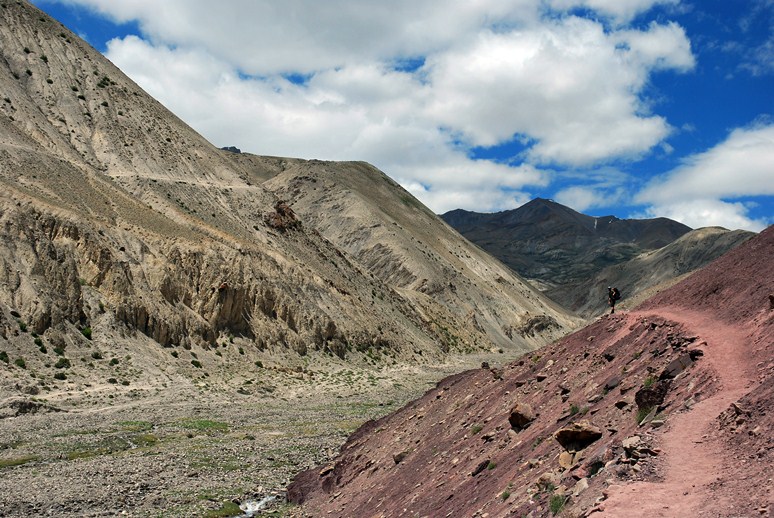
We had heard much talk about homestays in the Markha and
Ladakh in general. People seemed surprised that we were carrying our
own tents and food and a stove to cook it with. This was how things
were done in the States, but apparently not here. I could understand
this mode of travel in Nepal, where pleasant tea houses could be
found and where the temperature at night in December and January
would hit -20. But it was warm out and the weather was fine. Why stay
inside?
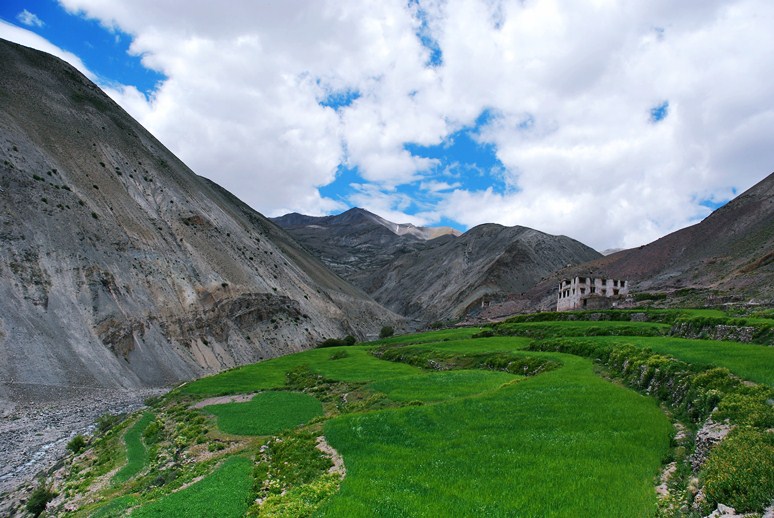
My headache grew worse and worse as we ascended and about a
quarter mile beyond the village we found a nice enclosed area, that
seemed to be a pen for holding ponies or livestock, and camped for
the night. It was just a bit beyond noon. My head continued to throb
and I was beginning to be short of breath, even walking normally
without a pack. I ate a bit of lunch (yak cheese, bread, cashews,
Diamox) and then set up my tent for an afternoon snooze. For three
hours. When I emerged my head still hurt, but I was breathing
normally and felt better. The setting couldn't have been better.
Brian and I fired up the stove and started cooking red lentils and
rice, with dried onion and vegetables. Good conversation. Brian and I
have lived very similar lives, despite taking radically different
paths to get there. The mode of living has been the same, if not the
surface details. We had a lot to talk about, though the more we
talked the more I missed Shauna.
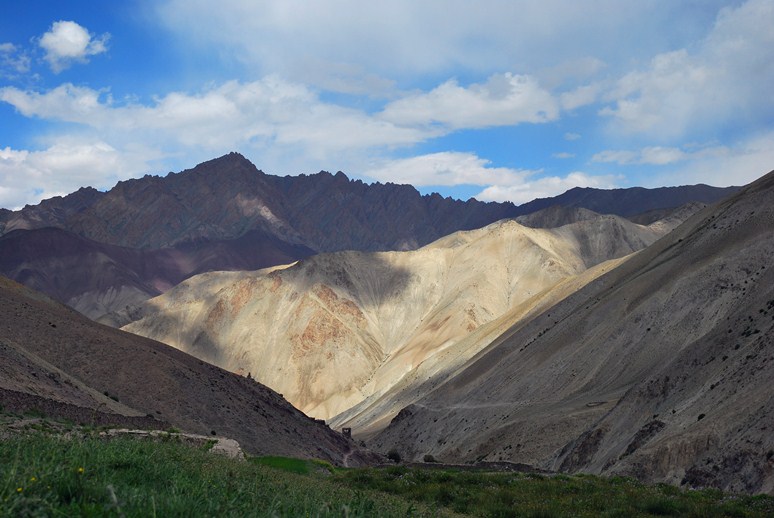
I knew quite well what I had back at home and what I was
missing out on while in India. I knew that we would continue where we
left off when I returned, and that we had an entirely new life
opening up in front of us. But I wanted to start on it right now, not
in seven weeks. I also wanted to be here in Ladakh, it the land of
high passes, where Tibetan culture was still to be found, where the
mountains soared above scorched desert valleys that hung at 14,000
feet. Tomorrow we'd hike over a nearly 17,000 foot pass. After a
descent and a run through a gorge, we'd be in the Markha valley
itself. I found myself in the unusual position of not knowing what I
really wanted to be doing, of where I wanted to be, of who I wanted
to be. It was a question to ponder. I had pondered it at length in
2003 on the Pacific Crest Trail. And now I was here, thinking the
same questions, but seven years removed. I would think. That is what
I do.
All the sleep yesterday afternoon and evening helped a lot and I awoke feeling strong and ready for our first pass of the trip. I put water on for tea and then tucked into a bowl of muesli and powdered milk. Brian stirred and started moving about in his tent. It was a tad after 6:15 when we set out under cloudy skies. It is best to hike in the early morning: The air is clear and cool, wild life tends to be out, and you get a great jump on the day while your mind is fresh and ready to accept inputs from without. We reached the lower base camp for the pass after about thirty minutes. Not bad for a littered patch of dirt, as far as those things go, but our walled off dung pasture was much more pleasant, I thought.
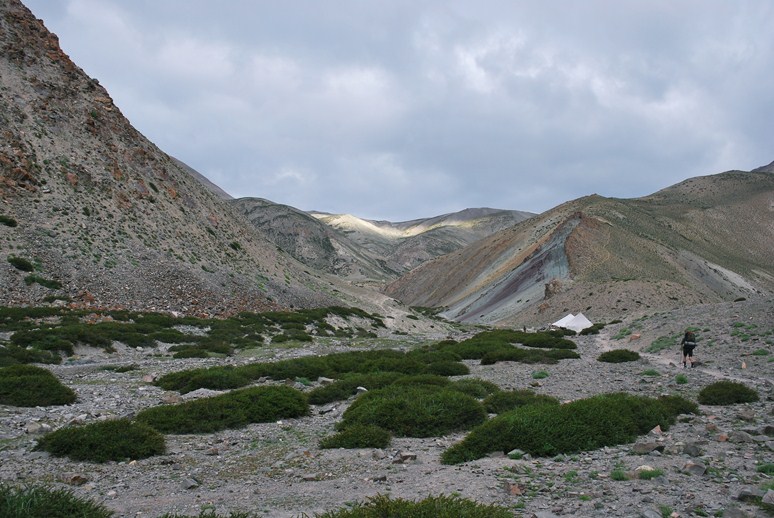
We took a slow, crawling pace through the thin air on our way
to the high camp, where a party was encamped. The slow pace was
necessary, not just for the sake of our lungs, but also to fend off
the otherwise inevitable altitude headache. It pounded me yesterday
and I wanted to avoid it today. Also to be avoided is the ill stomach
that comes with hiking at altitude, as well as fatigue. An absurdly
slow, but constant, pace is best. It was maddening to do, but the
half-pace got us to the high camp in fine order, followed by goat. A
party from Wild East Trekking was camped here. The French
couple and friendly guide were part of them, along with the dozen
ponies and six support workers. Three very sick Indian nationals were
clients. They were heading down, victims of a too rapid ascent. For
treks at altitude, the fastest way to get sick and have a bad time is
to go with a guided group, especially a larger commercial outfit.
Since you're on their time, you have to move at their pace. In Nepal,
groups like Exodus or World
Expeditions would routinely be
missing half their party. If you go, go by yourself or hire a local
guide.
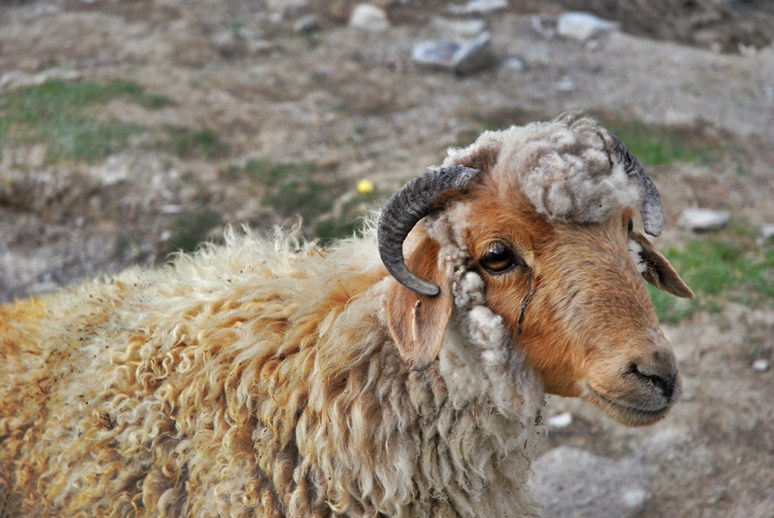
We left the campsite a bit in disgust as we watched the guides
and support staff toss their cans and other trash in pits next to the
campsite. The notion that somehow locals take good care of the land
is pleasant and appealing, but like the legend of the noble savage,
isn't grounded in any actual truth. The locals blame it on trekkers,
who want to eat paneer from cans and tinned peas and Coke and
whatever else they happen to have on hand. This is dubious reasoning
at best, but even if true, there is no reason to leave the trash
behind. Pack-it-in, pack-it-out is a Western ideal. As is
Leave no Trace. For all the
accumulated wisdom of the East, these principles haven't migrated to
Ladakh yet.
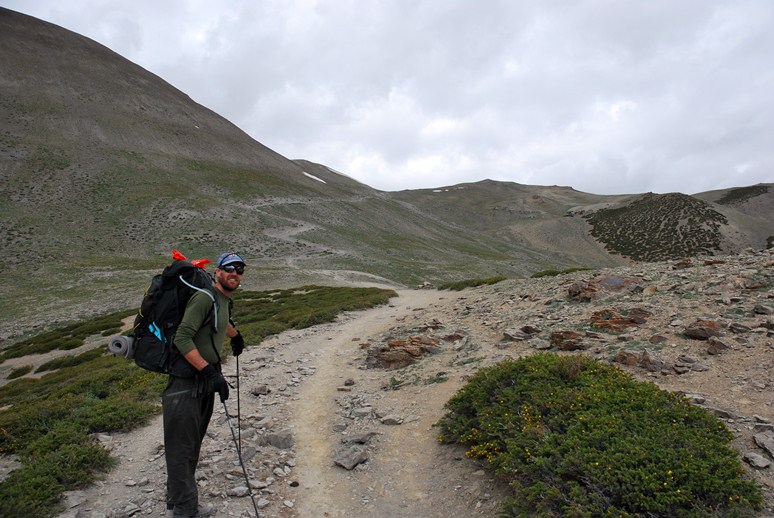
We hiked slowly out of the high camp and toward the pass,
meeting many of the thirty plus people who stayed in Yuruntse on some
sort of homestay. Several of them had slept on the floor in the
kitchen or out in the courtyard. I hadn't seen a tree since I left
Lakewood and the barrenness of the landscape was still appealing to
me. Open, rolling, rounded. Not sharp and craggy. Cold desert. I
avoided a headache, but had a roiling stomach when I reached the pass
about 10 minutes after Brian did, who quickly decided to fly a kite
at more than 17,000 feet.
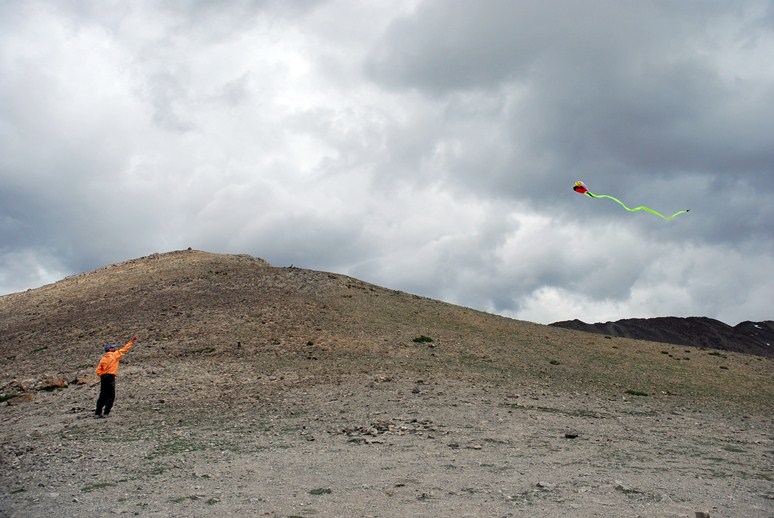
In the distance was a wall of truly alpine peaks, probably the
Zanskar range, where we would be in a few weeks. We were in a
radically different kind of terrain, though only separated by,
perhaps, thirty miles. The view gave as obvious a lesson in mountain
weather and climate zones as was possible. The more southerly range
was snowy, craggy, icy. They absorbed the brunt of the weather,
stripping the clouds of as much precipitation as possible. The land
closer to us was dry, brown. Desert. You see the same view standing
in the Panamints in Death Valley looking across the Owens to the
eastern face of the Sierra Nevada.
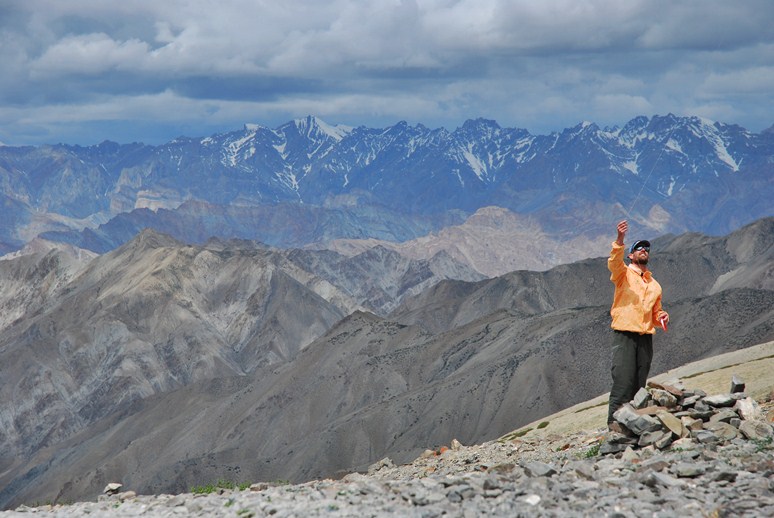
I dropped my back at the base of a rock wall festooned
with prayer flags and hid from the wind for a while. Yak cheese,
cashews, biscuits, water. Simple fare for the effort, but somehow
more appropriate than something more substantial, like a bowl of
chili. I craved a tall glass of butter tea. Salty and greasy would
have been perfect. Some Euros tried to photograph the goat, who
promptly butted them for their efforts to make him look cute.
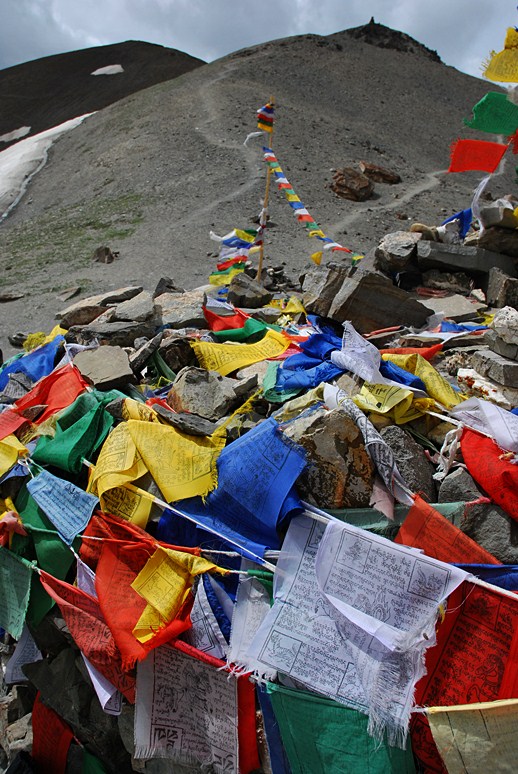
The multicolored mountains stretched into the distance,
stacked on top of each other in an arrangement that made you believe
in something like Intelligent, Artistic Design. The pass dropped
gently down toward a gorge, through which we'd have to pass in order
to make it into the Markha proper. The village of Shingo lay far
below in a vibrant patch of green at the top of the gorge.
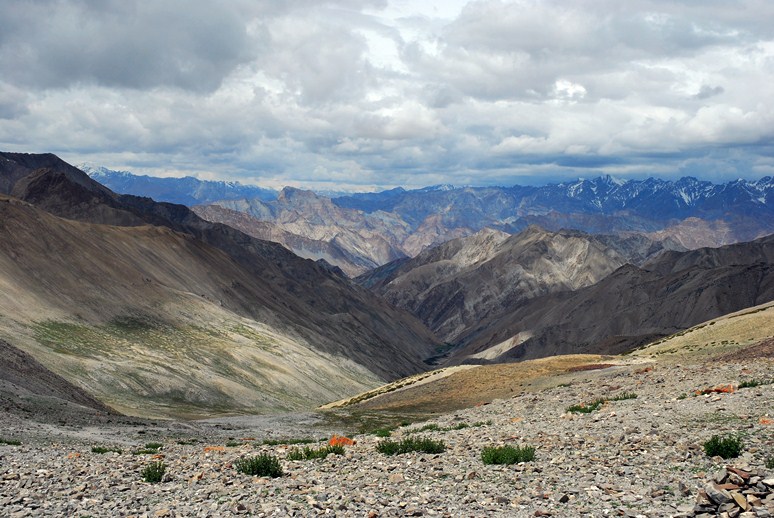
The Euros and Israelis began to depart, along with their Ladakhi
and Kashmiri handlers, leaving the pass a bit more quiet. It started
to hail on us, but that didn't seem to matter very much. I hunkered
down against the wall and gazed out at the land, in both directions
at the same time. North and South. Desert all around, but high
desert, with the alpine in the distance. And brown as far as the eye
could see. Brian and I chatted by the wall out of the wind. Brian,
like myself, is quiet by nature, preferring to let other people talk
until having something to say. But we were never out of things to
talk about, from the most frivolous to the sort of intellectual opium
that you hear tossed about on college campuses.
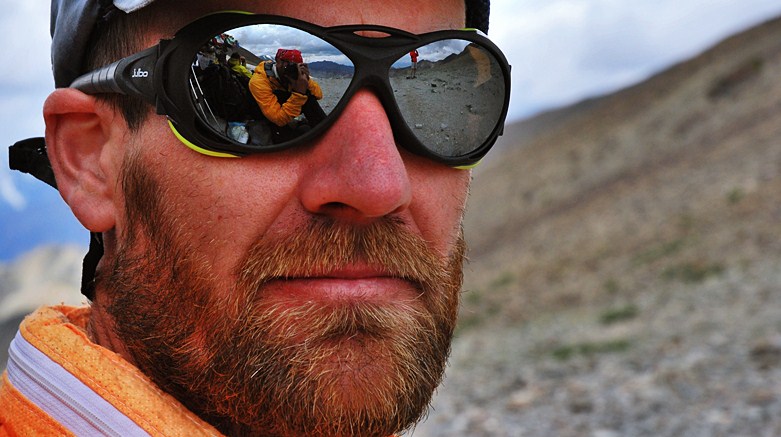
It was time to leave our perch. The rest of the trip would be
a valley run, with three passes tossed in for good measure. Most of
the others had left in a race to make it to Shiv before the others
took up the available homestays. We were planning on camping before
town in the gorge, in some scenic spot by the river. It was a good
way to travel, but it was not practiced here, at least by whitey and
at least at this time.
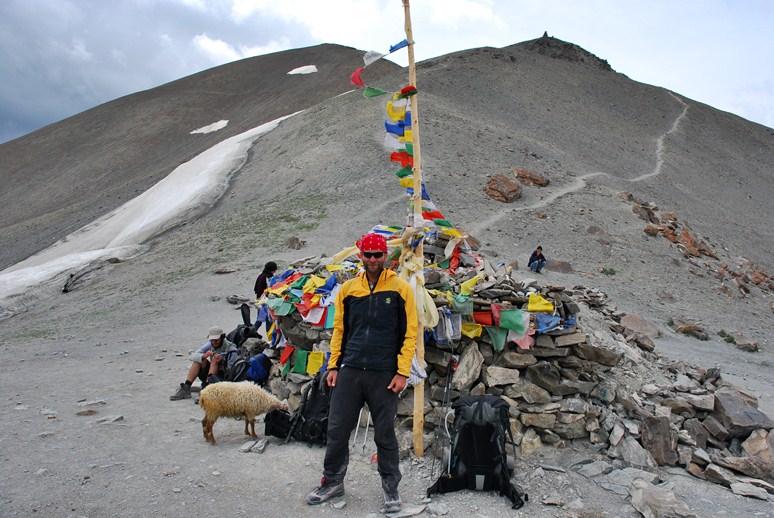
Brian and I chatted on the way down, dropping in elevation
quickly and passing several very tired trekkers on their way up to
the pass. More homestayers, I thought. Little packs, depressed
looking. I could understand the hurt, as I had been hurting on the
way up to the pass. But I had a great campsite waiting for me
somewhere. They had a parachute tent in Rumbok to look forward to.
Not a great vision.
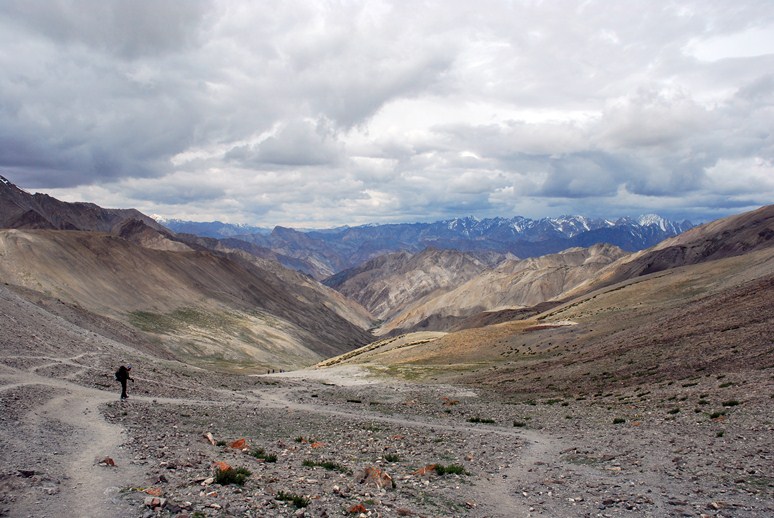
We dropped down into a flat plain leading up to the top of the
gorge, where we found a parachute tent run by an old woman who made
extra cash (her only?) selling Maggi and
tea to trekkers. We got one of each, noting the rapidly heating air.
Although the pass was chilly and hailing, a thousand or so feet lower
it was hot, and getting hotter. The air was stagnant inside the tent
and I began to sweat as I ate my noodles and drank my tea. A group of
four homestayers showed up. Two Israelis, one Frenchman, and a South
African. Talkative and happy, they were all smiles. Clearly enjoying
their time, they were hiking from homestay to homestay and had been
traveling for a while. The South African was at the end of the
national right of passage: The around the world trip taken sometime
between the end of high school and the end of university.
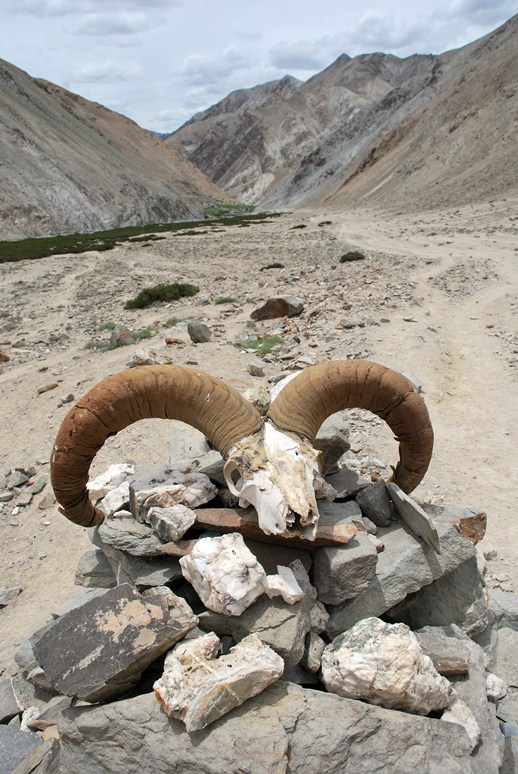
The two Israelis had done a lot of trekking, but very little
of what we would call backpacking. They eventually pried out of us
some of our collective hiking history, which prompted more and more
questions, usually of the gear variety. But fun nonetheless. A family
of donkeys strayed into the tent area and the old woman turned
ferocious, swatting at them with a large stick. The loud THWACK
hinted at more power than her slight frame indicated. The Frenchman
was also on an around the world trip. Collectively, they made the
video game playing, angst ridden, apathetic, unmotivated, ennui
filled youth of America seem even
more pathetic than normal. So, maybe that wasn't entirely fair. But
it was at least partly true.
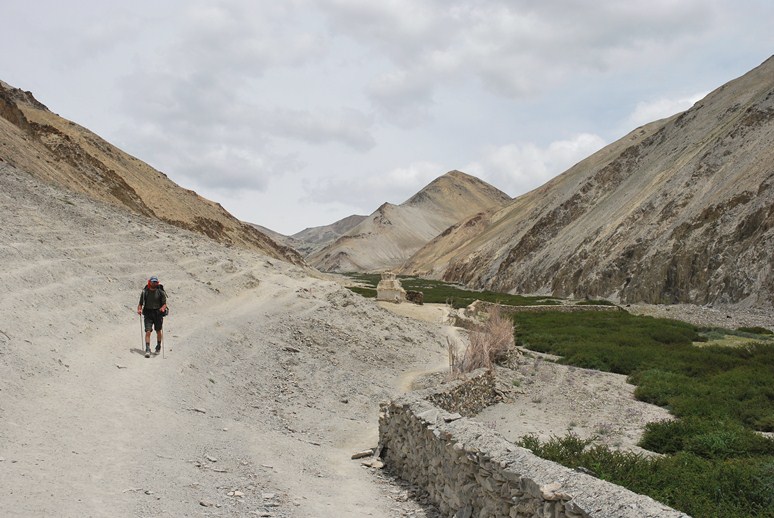
We hiked out of the tent and through the village of Shingo,
which was clean and well cared for, and even sported a water driven
grain mill. Clever Ladakhis.
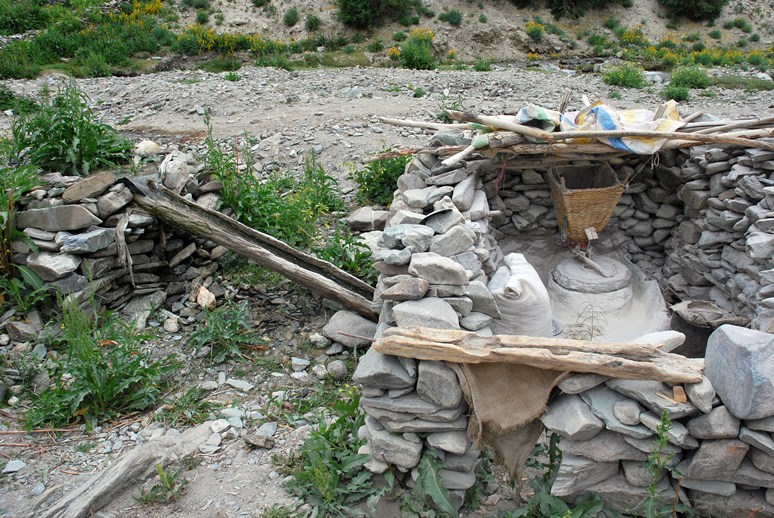
The heat was getting oppressive, though there was a pleasant
breeze in the gorge that helped cool my sweaty skin. My thermometer
read 95 degrees. The gorge itself was absolutely stunning, with
multileveled rock painted gaudy shades of purple, pink, ochre, and
green, in addition to the usual hues of brown, tan, beige, and grey.
The shapes the rock took on were Abbey-esque, making both of us feel
at home on the other side of the world from where Cactus Jack
used to roam.
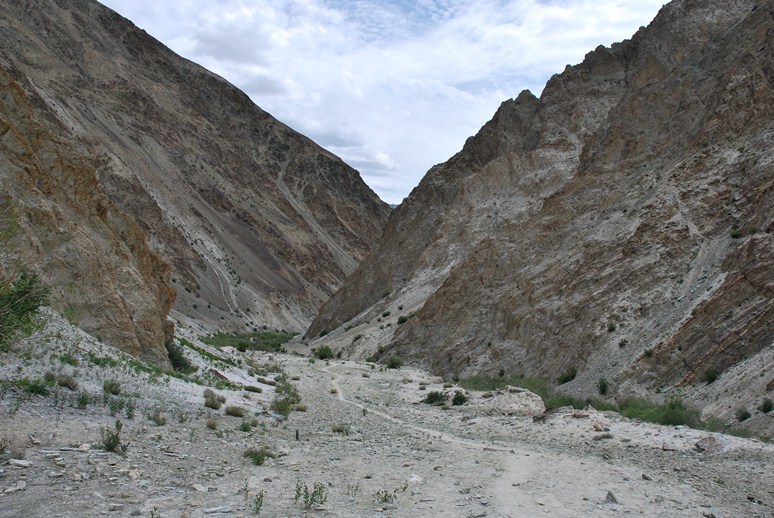
The gorge tightened and I should have been growing happier and
happier, but instead my thoughts were on the other side of the world
with Shauna. About being domestic and tranquil, not that she would
not have been thrilled to have been on this summer's foolishness. To
quite the contrary, she had tried hard to make things work out and to
come with me to the Himalaya. But as I was realizing my aims and
desires were shifting elsewhere and to other things. To new things.
Brian and I found a stunning campsite at a cliff above the river and
called it a day. I soaked my feet and rested before dinner, which
didn't go as planned. The stove was acting up and never quite got to
full blast. We built a fire out of twigs to finish off our noodle,
soya, and vegetable dinner and then retired to our collective tents.
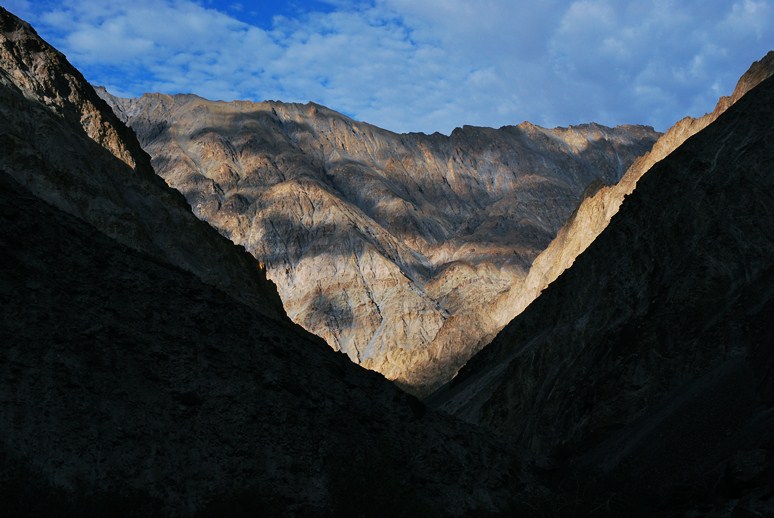
Tomorrow is going to be a sweat fest in the valley, with no
trees to shelter us from the sky, unless the morning clouds hang
around through the afternoon. My head and heart were not in the
present, which is difficult to control and worse to deal with.
Although I felt fine physically, mentally I was not doing as well as
I should be. I felt pangs of loneliness, even though Brian was here
and was happy to talk about anything and everything, no matter how
obscure. Loneliness is a rare feeling for me when I am outofdoors.
Rare enough that I could remember when it happened on long trips in
the past. And those trips didn't work out to the extent that I wanted
them to. I'll have to come to an understanding with myself if I
wanted the next six weeks to be enjoyable. That's on me. I can
control that. I put my sleeping bag over my lower half and read some
more Hesse before spending
some time pondering. Pondering in a quiet tent by a flowing river in
the Himalaya.
It was not going to be a good day. It was 5:30 am and my back hurt as I squatted over the sputtering stove, hands black and greasy from the dirty kerosene. I felt like kicking the stove into the river and being done with it. The stove had misfired last night, forcing Brian and I to finish cooking our dinner on a twig fire. I thought I had fixed it, but after a solid two minutes of burn, the stove had sputtered and died, choked by something. There was a fuel pre-filter in place. I had clean the jet many times. And here I was, waiting for tea. It was 7 am before we left, the cool part of the day spent, and I was not in a good mood. We hiked down river and reached the first town, where an old man was stoking a fire. We settled in for tea and watched him work metal over the world's smallest anvil.
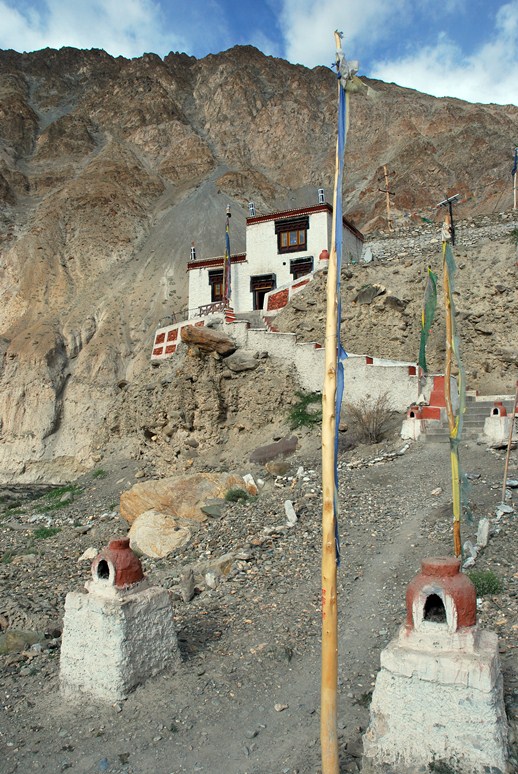
Tea didn't help. I wanted to be elsewhere. Anywhere. Long
trips are hard at the start. Every time, with few exceptions, that I
set out on a long trip I've experienced the same thing. Complete
lethargy and lack of interest after a day or so. You battle through
it and hope for the best. You hope that the future will be better
than today, and that allows you to move forward, rather that
decomposing in a heap of self pity.
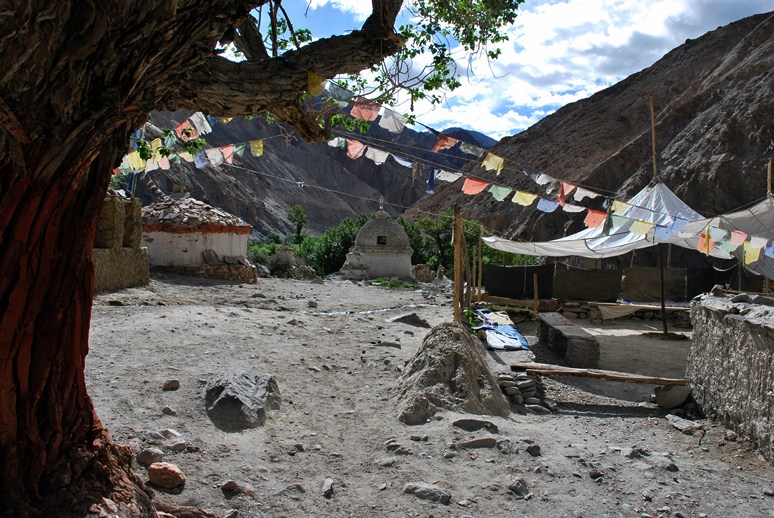
The Himalaya had turned itself into a desert gorge in the
western US. Brown hills ran to brown summits, and a brown river
flowed through the middle. It was dusty. This wasn't helping.
Intellectually I understood that I was passing through a stunning
region, but it was not making an impact on me. It was there, but I
was not.
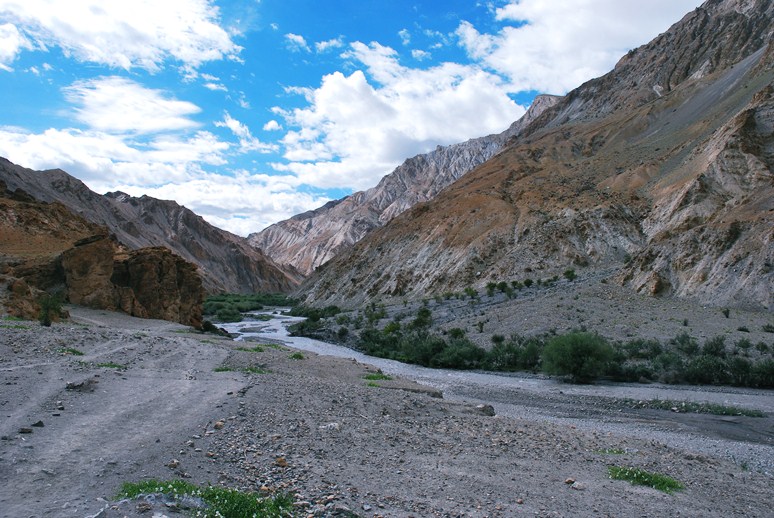
Brian slowed to keep me company in the growing heat of the
day. I was already exhausted. I was breathing heavily and my pack
felt like I was carrying a mule along for kicks. The scenery
depressed me as I thought of home. Should just have stayed home and
watched a video about the Grand Canyon. Could have been riding my
bike somewhere fun. What are the stool roosters at Jakes
doing? I was dragging. A bit of
shade by a spring was a welcome relief from the heat and the walking.
Poor me. Have to walk in a beautiful place with a good friend under a
sunny sky. Poor, poor me.
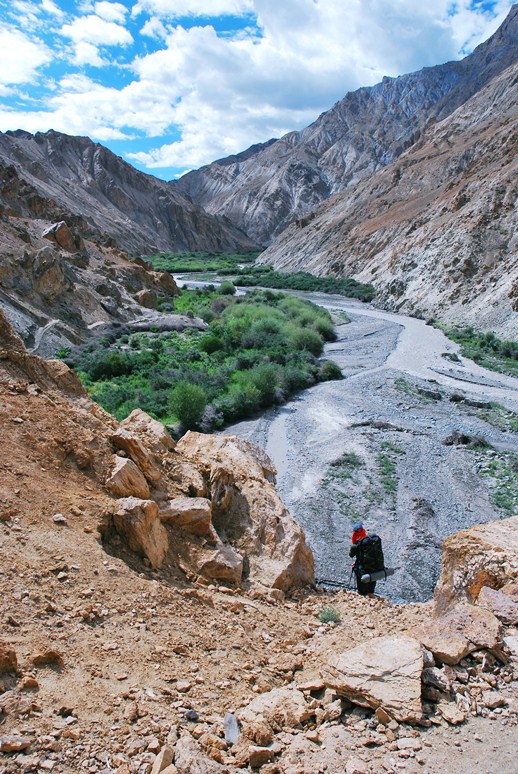
Not far from the spring we found a parachute tent selling tea.
Inside were three jolly, rotund Americans having the time of their
lives. The man had been in this part of the world back in the hippie
days and was back reliving his wild and unspoilt youth. With him were
his wife and her friend and two local guides, who spoke English just
fine and were happy to talk to us about some route options in the
future. The Americans were covering almost no ground every day,
perhaps six or seven miles, and have a fantastic time. I knew the
feeling and wished I could steal it from them. Or at least borrow a
bit of it.
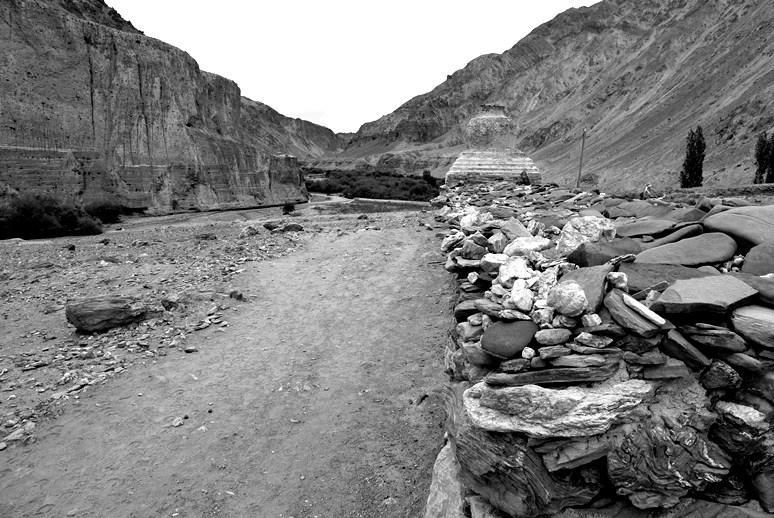
I was on a death march of sorts. Panting, sweating, too tired
to swear. And I wasn't doing anything difficult. I was walking on
nearly flat ground with maybe forty five pounds on my back. I was
doing it at 14,000 feet. And I was tired. The intellect was still
there. I was still taking pictures. But I was not happy. The cheery
Americans were behind us, stopped for the night. I was forcing myself
forward.
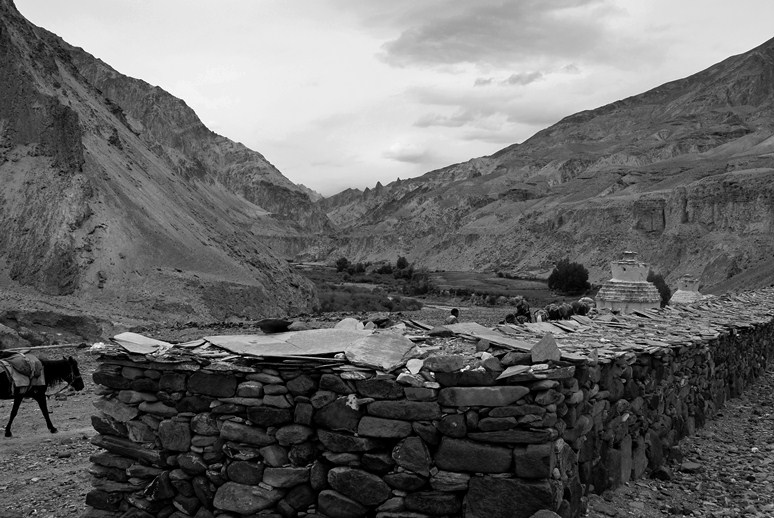
We rumbled to a river crossing where we stopped to filter
water and I stopped for a needed rest. I needed water. I needed time.
I needed food. I was spent. We slogged on, over a minor ridge and
down to a dung covered field where we pitched for the night. It was a
stunning camp site and I was happy to be here. This had been one of
the worst hiking days of my life, and I'm an expert on self induced
suffering, so this says a lot. But it was all mental. Brian was fresh
and chipper and happy. All mental. I worked on the stove to take my
mind off of things, remembering something I had read in a book on the
holocaust. It didn't help either.
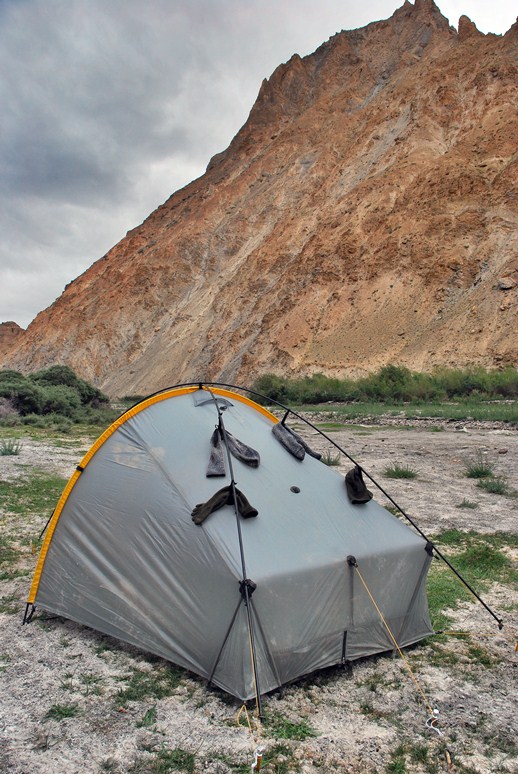
Today was going to be better. It had to be. That was the
pattern. The groove. The rut. The stove even worked, allowing me to
drink nearly a liter of tea along with my muesli and powdered milk.
It was cool this early in the morning, but the clear sky meant a
roaster later on. Although my mental disposition was improved, my leg
was hurting, which was not good. Nine months ago I had been hit my a
speeding pickup truck driven by an old man who left me by the side of
the road to die. He was caught later on. My leg had been broken and I
had re-occurring pain at the break site. I'd probably always have it.
A few cold fords of the Markha river helped to calm it.
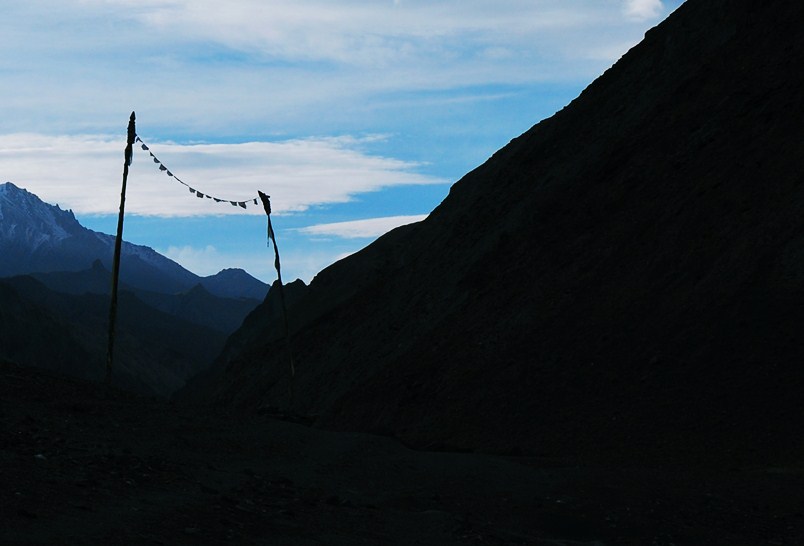
The light was exquisite this morning. Perfect in every way
possible. I've been to many places in the world, but none is more
photogenic than here. No place tops the Markha. And I had a sense
that it was only going to get better. That we were in the junior
leagues of scenery. And that moved me. For there is no stronger of an
inducement to action than the hope that there is something just a
little better around the corner, over the fence, down the road, in
the next state, across the continent, over the sea, across the
emptiness of space.
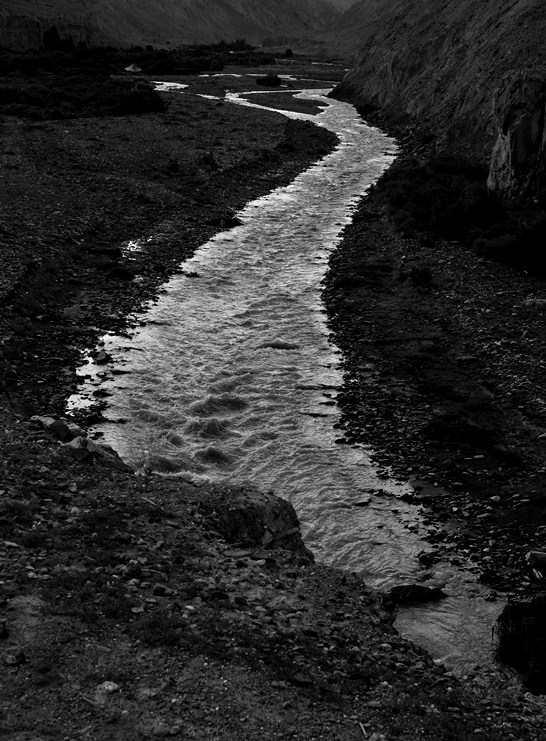
Some people wander because they are lost. Other people
wander to find something. Others wander because that is who they are
and they know no better life than to see what is on the other side of
the river. The village of Markha was stirring this morning, beginning
its day in the usual way of rural settings the world over. Markha was
a relatively prosperous village and seemed infinitely more pleasant
than Leh. It had a school and a monastery and brilliant green fields
with yellow flowering plants.
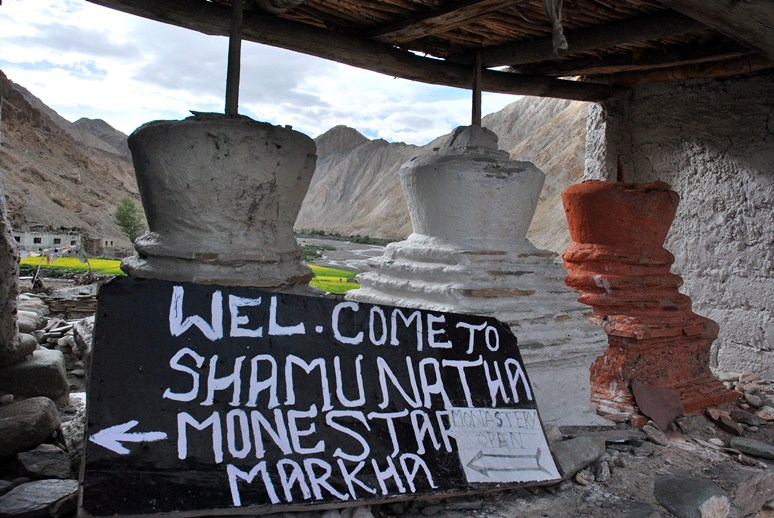
This was the contrast that I had hoped to find in Ladakh.
The village sat near the river bottom, with soaring desert mountains
thrust up over head, canyons snaking into the distance. Stone
monasteries with radiant fields fed by hand dug irrigation projects.
I paused for a moment to let Brian move out in front. I wanted to
pause for a while, a pleasure that was rapidly disappearing in my
life as I grew older.
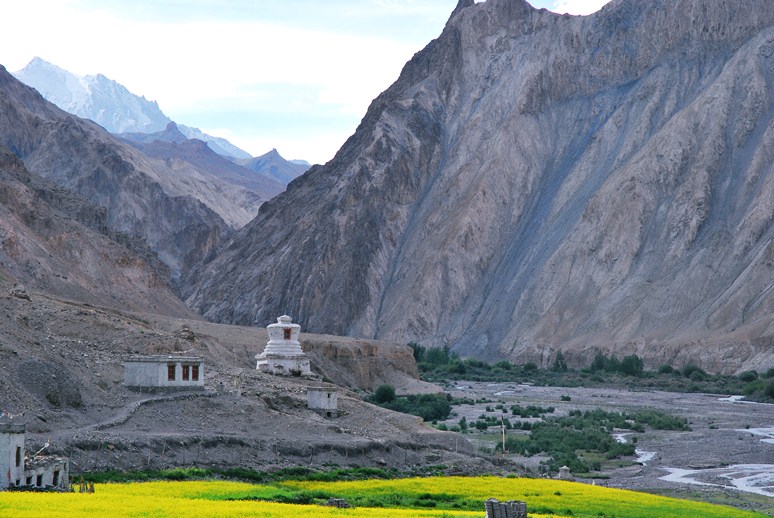
For the last decade I had been wandering through the world,
through my country, around my apartment or house or tent or tarp, or
where ever I called happened to be calling home for the moment. I had
consciously constructed a life that allowed me to take time off and
move freely, without constraints. But now the wandering was beginning
to end. And it was again a conscious choice. An active decision. I
wanted to build something with another person, and to do so I had to
have ties, roots, a grounded life. I didn't want the wandering to end
completely, either. I didn't want the contemplative time to vanish as
I assumed the mantle of a householder. I would need to pursue
balance. It always seems to come down to that.
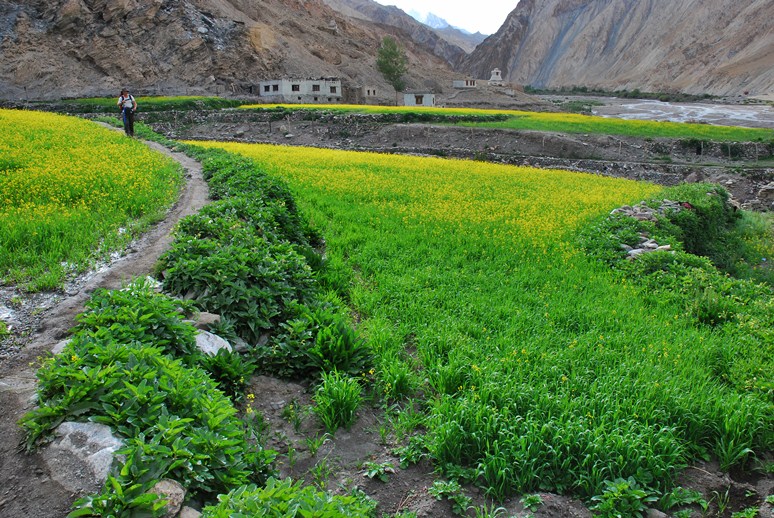
The three of us regrouped at the far edge of the village and hiked
together for a while. Brian and I had decided not to do the extra
passes and distance that we had planned for as I had been struggling
recently just to move along the relatively easy Markha. We were now
at the turn off point for the extra work and it was easy to make the
call to continue straight ahead. A massive rock spire seemed to mark
the spot. Instead of going the harder route, we sat on rocks and ate
unsalted, unroasted cashews and yak cheese.
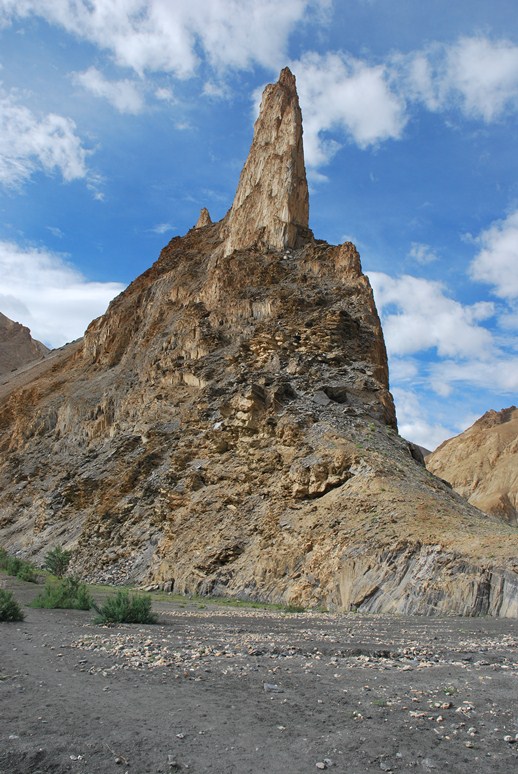
We crested over a minor ridge and ran into the pony
train for the two French hikers and their ninety seven support staff.
In reality there was a guide, five ponymen, and ten animals. It be
fair, they did originally have four more people in their group, but
they washed out after the first night below the Ganda La. The trail
dropped off the ridge and down to river bottom once more and was too
confining for us to pass the pack train. We walked in their dust and
droppings, which was not especially pleasant.
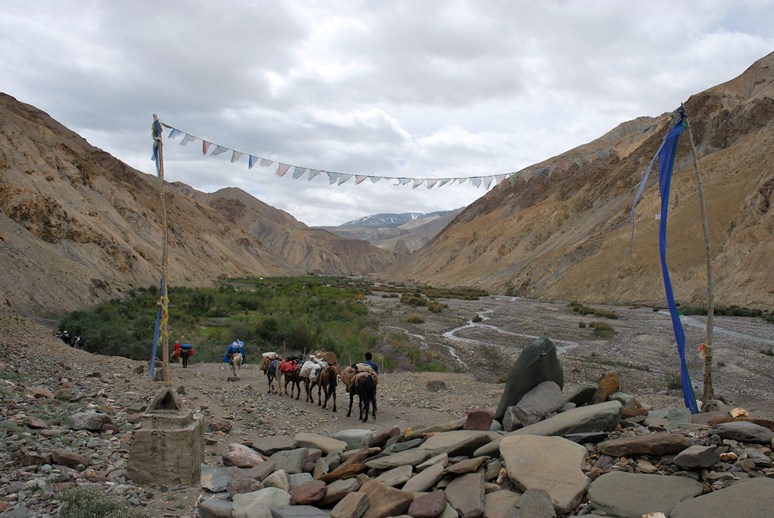
We pulled off in the hamlet of Hankar at a parachute tent for
tea and Maggi and a rest. The
pack train moved on. There were a couple of kids in the tent and so
Brian fished out a couple of balloons to play with. Shy at first,
they quickly gave in and soon there were smiles and laughter and play
abounding. Brian took out his bubble blower as well, which the kids
seemed to like even more than the balloons. The wind picked up, which
blew the balloons throughout the village, provoking even more fun as
the kids chased the balloons down. When one would inevitably pop, the
kids would give a start, then laugh even harder and Brian would blow
up another for them.

I felt better than I had in several days and was happy to
be where I was. I actually was here, instead of trying to be in
California with Shauna. Watching the kids at play certainly helped.
But so did the scenery. It was getting better and better as we
progressed up the valley. A massive snow pyramid at the head of the
valley marked our future.
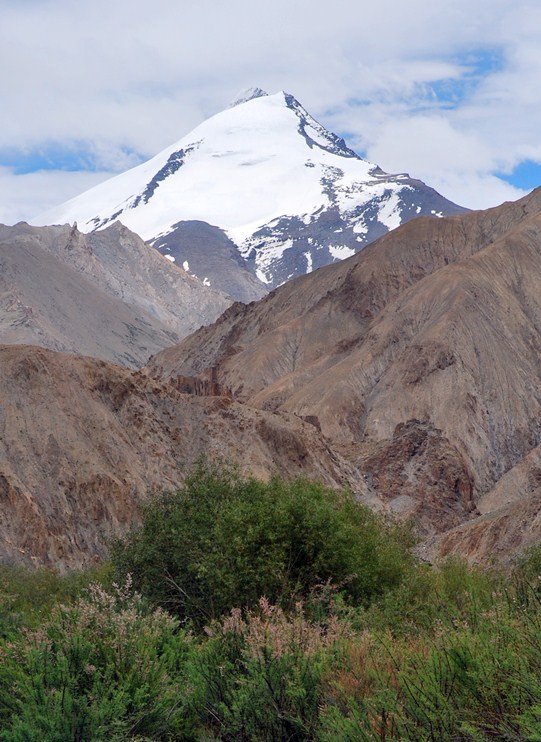
We hiked out of the village and down to the river, which
was clearly impassable. We thought about it for a moment and then
returned to a tent we saw pitched in a field next to a stone fence. A
man inside was drinking tea. In broken English and with plenty of
hand waving, we figured out that we needed to go up and through a
narrow rock band that would lead up and over to a better stretched of
trail.

At this point it didn't matter to me where we went. The path
up was steep and dusty and I was sweating, but I was also contented.
I was looking forward to the top, to the next village, to the next
chorten or mani wall.
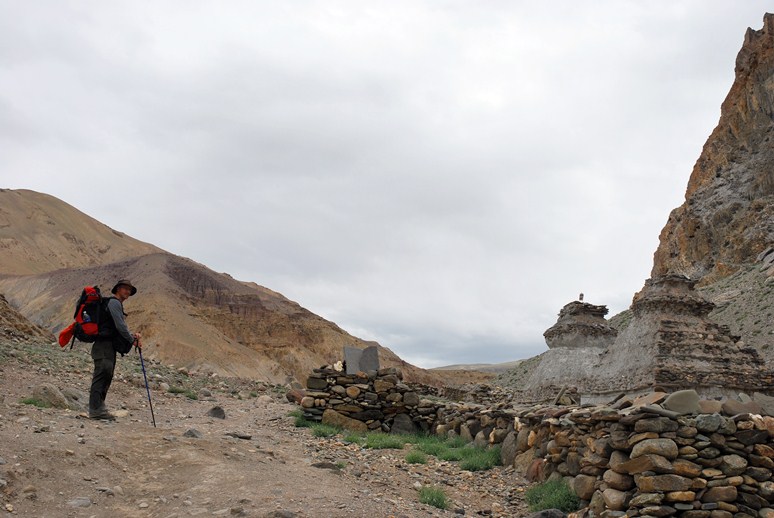
A ruined gompa marked the top of the minor bluff we had just
climbed and excellent views were to be had of the surrounding river
bottoms and villages, along with the heights of the mountains.

We stopped in a village where some Frenchmen were sitting in a
flower field waiting for the owners of a homestay to come in from the
fields. A few kids were standing nearby, unsure of what to do. And so
Brian got out the balloons again and the scene repeated itself.
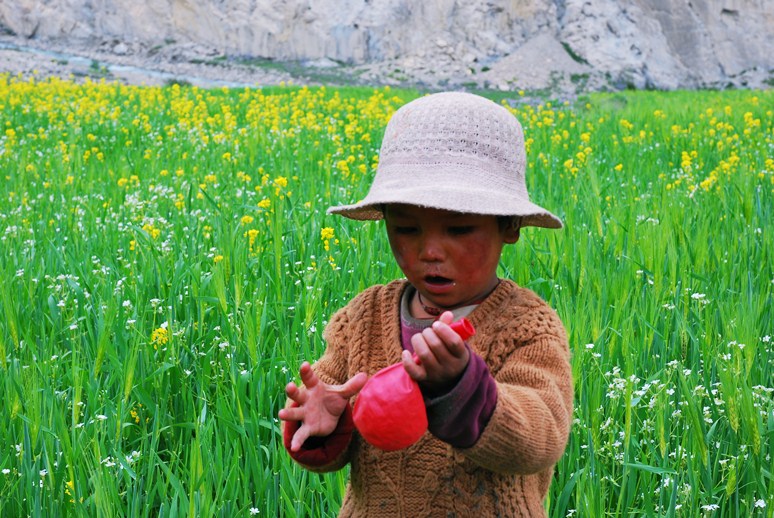
This little boy, even with all his snot, was about as
adorable as a human can get.
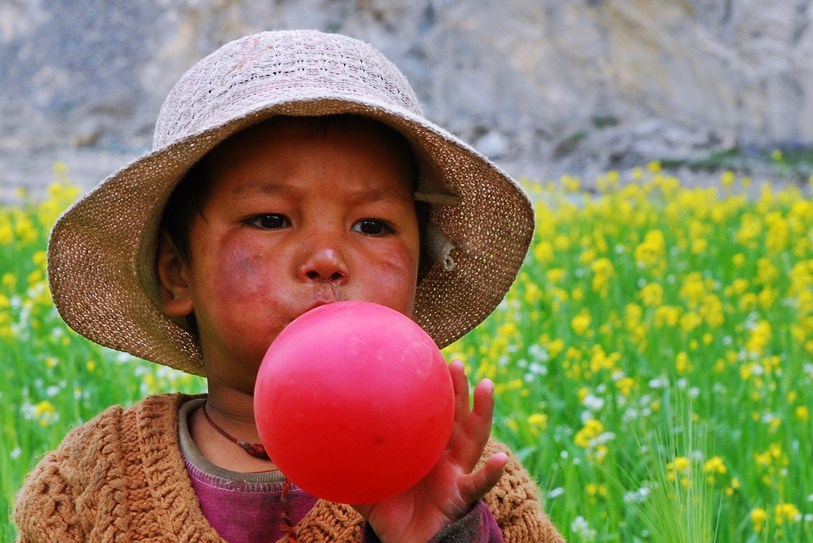
As a secondary treat, Brian got out his kite and started
to fly it, which caused yet more village children to come over and
see what the strange hairy palefaces were doing.

I should have been thinking about the contrast between these
children and the ones I didn't know back in Lakewood. About the
difference in life experience. In growing environment. In future
prospects for material well being and in happiness. I should have
been thinking about all those things, for here was a lesson writ
large, acted out in front of me so that only the most dimwitted could
ignore it. But I wasn't thinking those things. I am thinking them
now.

I fired away with the camera. And smiled a lot. And that
was the extent of my activities in the flower field. Brian was
playing with the kids, running and romping. The kids squealed and
Brian laughed. Or maybe the reverse.
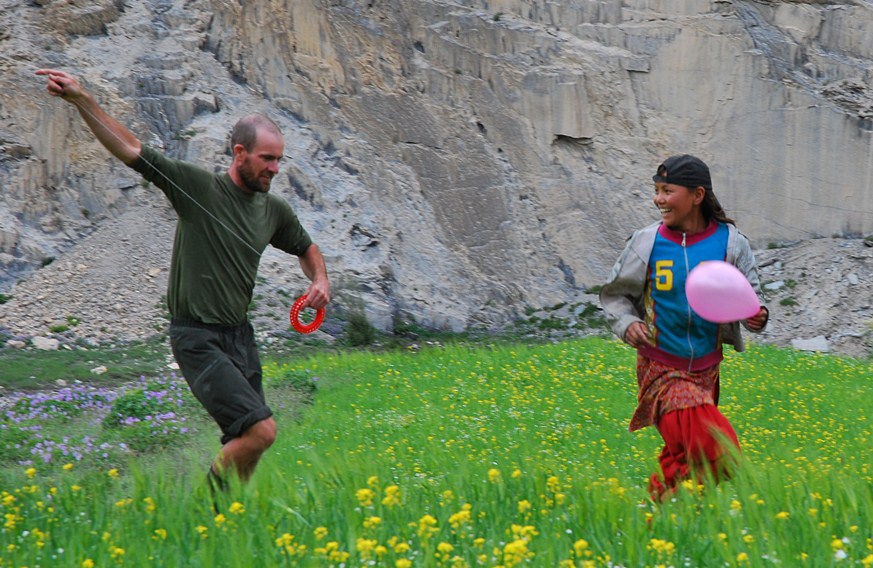
The unrestrained play and joy of children is something that is
good for the soul and it was with some regret that we packed our bags
once again and moved on. The skies were threatening and we still
needed to find somewhere to camp for the night. But one more photo of
pure joy before we move on.
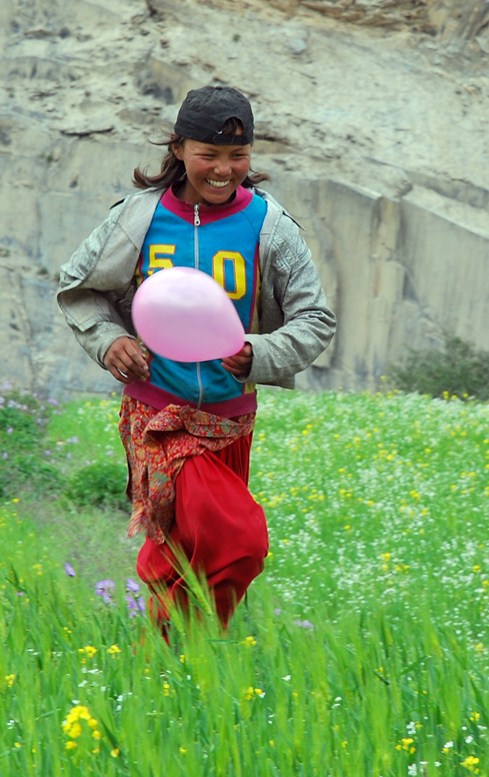
The massive white pyramid in front of us was for a later
day. We had left the Markha river and were now following the
Nimaling, a smaller, though powerful river, that feeds into the
Markha. We pushed over 4100 meters, about 13,500 feet, and I began to
tire with the altitude. It was only two thirty in the afternoon when
we finished for the day, finding a broad, if dusty, plain to camp on,
complete with easy water access and a few discrete boulders, just
down canyon from Tahungtse.
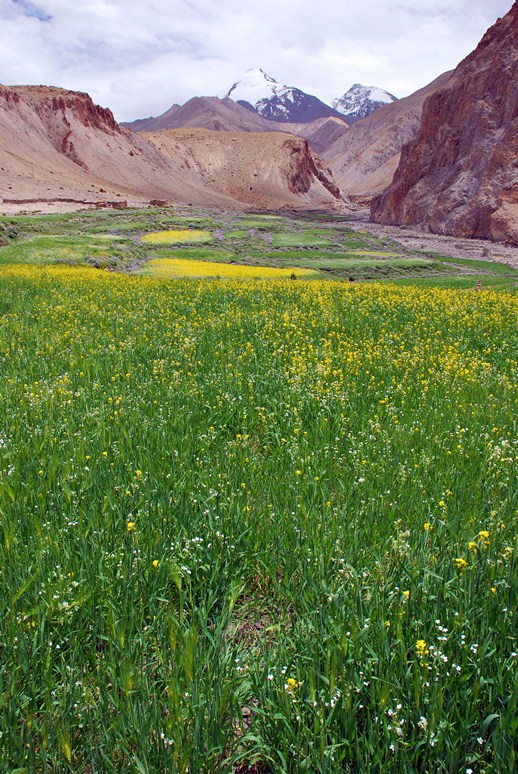
The storm that had been brewing hit us just after we set up
and so I had some lazy time inside the tent to read and write and,
well, laze about. At dinner time I emerged, at the same time Brian
did, and we started in on our evening chores: Dinner and
conversation. The stove was continuing to cause problems and I found
myself cleaning it on an almost daily basis. But it had become a
ritual, and like any ritual it was beginning to take on a life of its
own. The nightly dousing of hands in kerosene. The nightly scrubbing
of said hands with gravel and sand. The stink of the fuel. It wasn't
a ritual I especially liked. Brian and I talked for an hour or two
over the ritual and over dinner. It was good to have someone to talk
to for long expanses of time, especially someone like Brian, who had
actually spent time thinking about the things he would later talk
about. I was glad that Shauna did too.
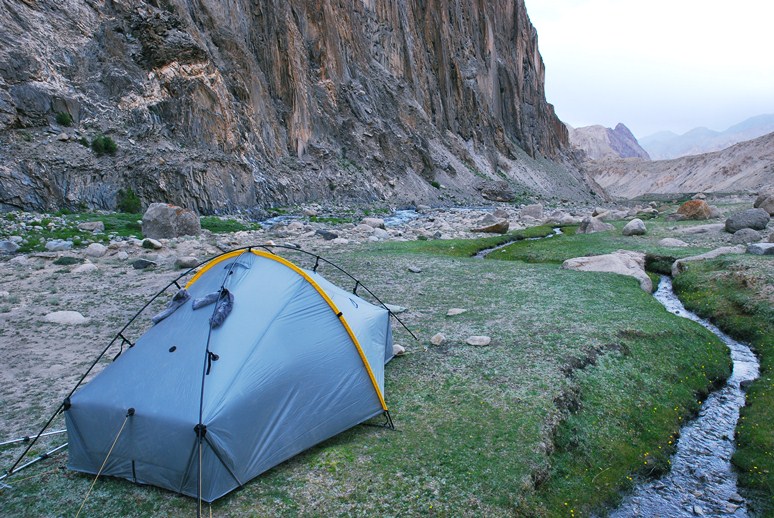
It was an honest cold this morning that Brian and I felt as we
shuffled through the camping hamlet of Taguntse. The herders were
sleeping and the guides and ponymen were just stirring. The pale
light and frosty air were stimulating, as was the slow slog up toward
and past 15,000 feet.
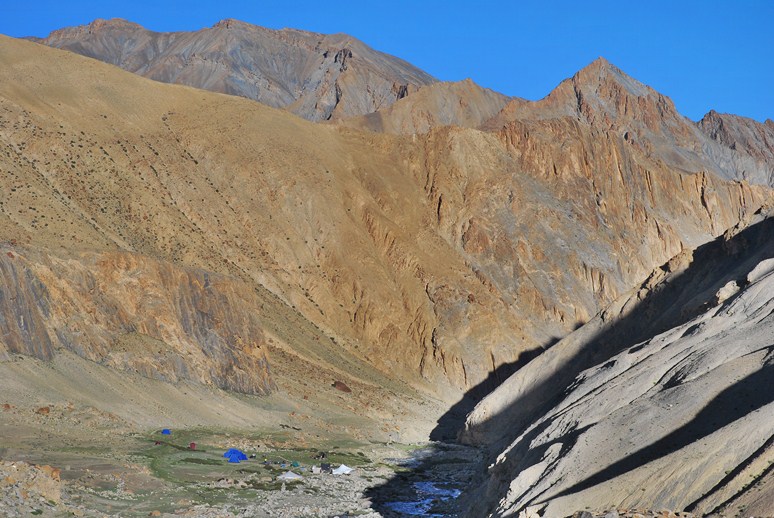
The land was opening up for us as we left the gorge holding the
Nimaling for the open plains and high passes that I had expected, but
rarely found, in the Markha. High above us on the pyramid we could
see three dots, climbers, descending from the summit, no doubt
pleased with what they had accomplished. Down here, though, the land
was quite different than the icy slopes that the climbers were faced
with. Neither Brian nor I could quite come up with the right
comparison for this place.

It had the light and texture of a sort of hybridized
version of Abbey Country and Death Valley. Bizarre rock formations
and wild banding in the rock brought forth memories of trips we had
done throughout the desert regions of America. But soaring above were
white, glacial mountains, reminiscent of the Cascades or Olympics.
This place was not the Sierra, nor did it even vaguely resemble the
Himalaya in Nepal. Although each place should be regarded as its own,
it is a very human quality to compare a new place to a familiar one.
But we completely failed at this human task.
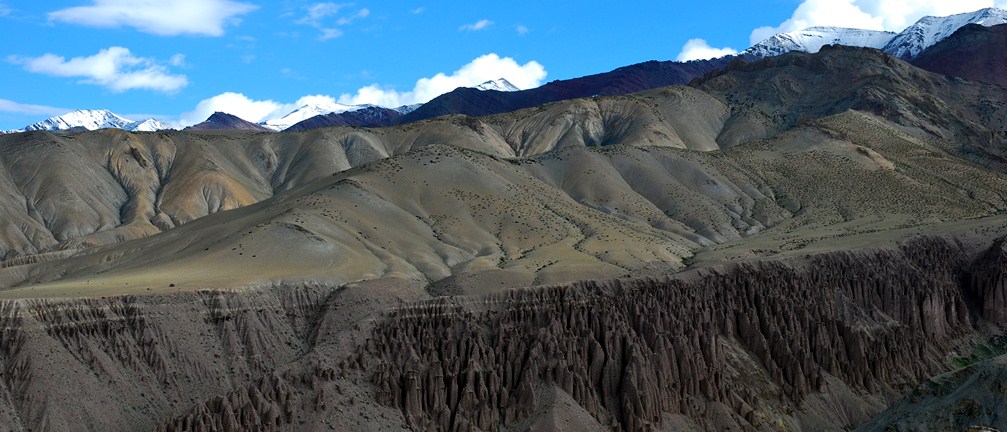
Brian and I stopped by the side of small alpine tarn with a view
of Kang Yaze, where we lounged more out of gluttony than out of any
need for rest. We were in what my mind's eye thought Ladakh would be
like, and I wanted to linger for a while. Several groups of hikers
passed us on their way to a herder's encampment where we, as well,
were heading. Some paused for a moment and then hiked on. Others just
hiked on with a casual word of greeting.
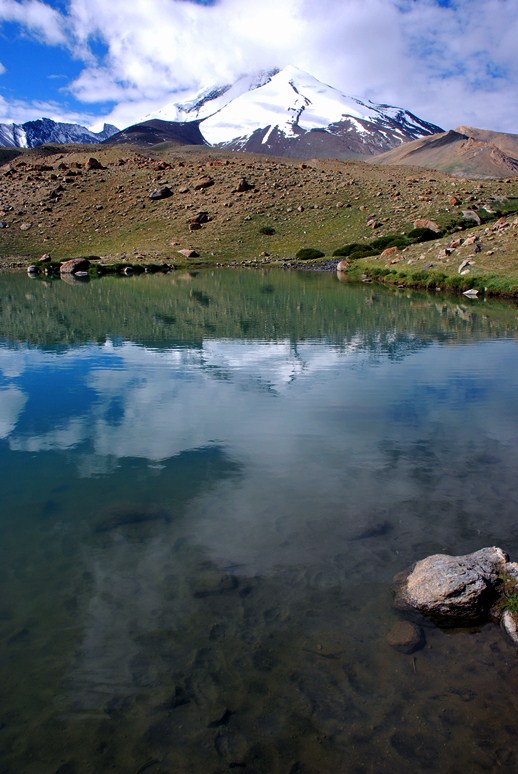
The lake and mountains and plains and grasses made up the land,
but they were not the land. The landforms are not the same thing as
the land, just as the trees and plants and shrubs and critters are
not the forest. A whole is more than the sum of its parts, even
though it could not exist if one of them was removed. The pleasure I
got from the lake was not due to the lake, nor to how the light
reflected off of it, nor how the mountain shimmered in reflection. It
was not due to any of these things, though if they were removed my
pleasure would be diminished.
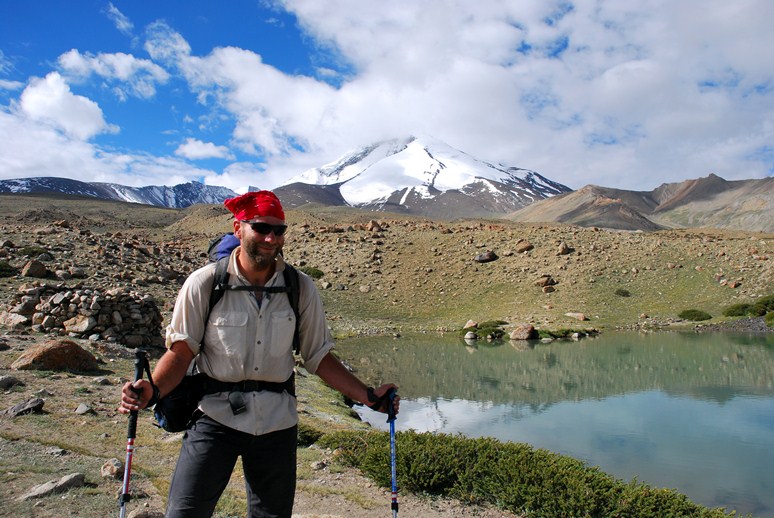
Brian and I set off together, but quickly separated into
our own worlds. We are both contemplative types and understand the
need for solitude while thinking or appreciating something. I let my
mind wander around, indulging in a fit of mental laziness while
soaking in the increasingly vast area marked on our maps as the
Plains of Nimaling. We were
ascending the river valley toward a pass known as the Gongmaru La,
which we would tackle tomorrow. The sheer size of the plains was
impressive and gave the mind a sense of space that allowed it to roam
freely. When settlers in America first emerged from the woods and
hills of Appalachia and the Allegheny Mountains, they were confronted
by the prairies and plains of the Midwest. Some were horrified by
them and their openness and returned home, or continued further
toward the sun. But some embraced them. As I would have done.
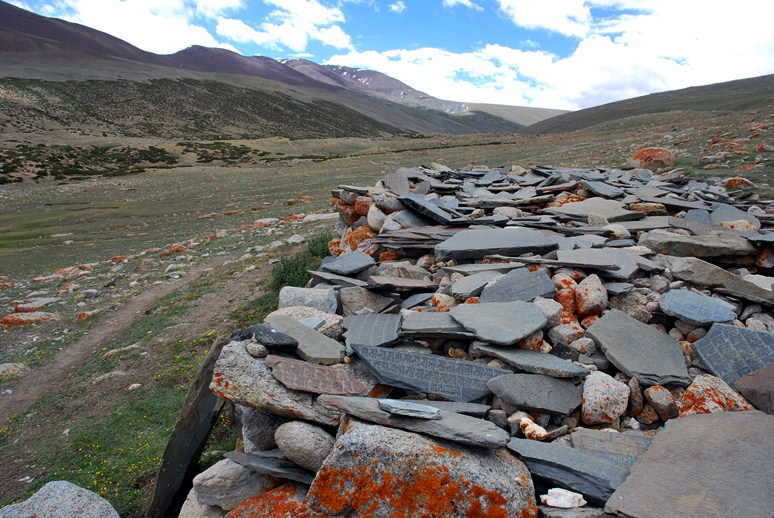
The vast plains are the summer pasturage for the local
nomads who raise sheep and goats for the wool that can be produced
from them. Animals are too precious for eating, at least until they
die of old age or a fall. As I was entering the camping area, marked
by several large parachute tents and encampments for guided groups,
the flocks were let out and I found myself in a giant herd of animals
running for the bits of scrub vegetation that they could get on the
hillside. The shepherds moved amongst them, driving the animals
forward and corralling the wayward ones. I was surprised to see that
they did not have dogs working for them.
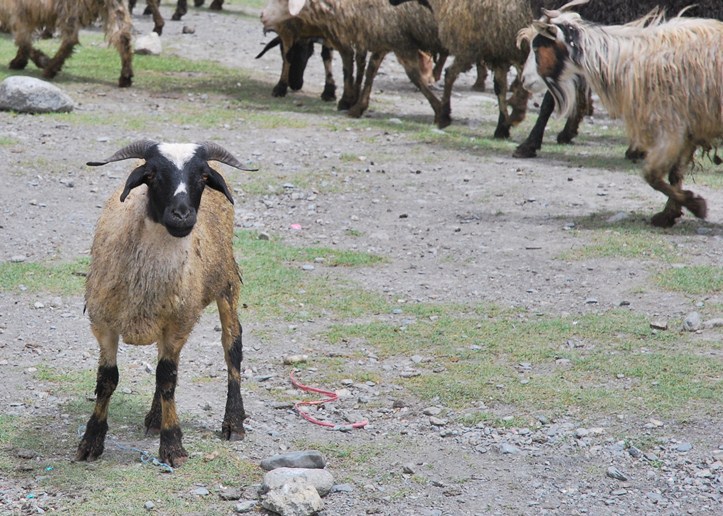
I found Brian and Aaron inside the main parachute tent
drinking tea and eating Maggi,
in which I joined them. The two Israelis and their friends, the
Frenchman and the South African, were here are well, debating whether
or not to stay the night or to head over the pass and try to make the
next village some time before nightfall. A little boy from the herder
camp was pestering them for trail mix. After getting some, he
continued to beg for more, though he had not eaten the last of what
he had been given. When the Israelis were not watching, he would dig
into their packs, not looking for anything in particular. He was just
being a bastard.
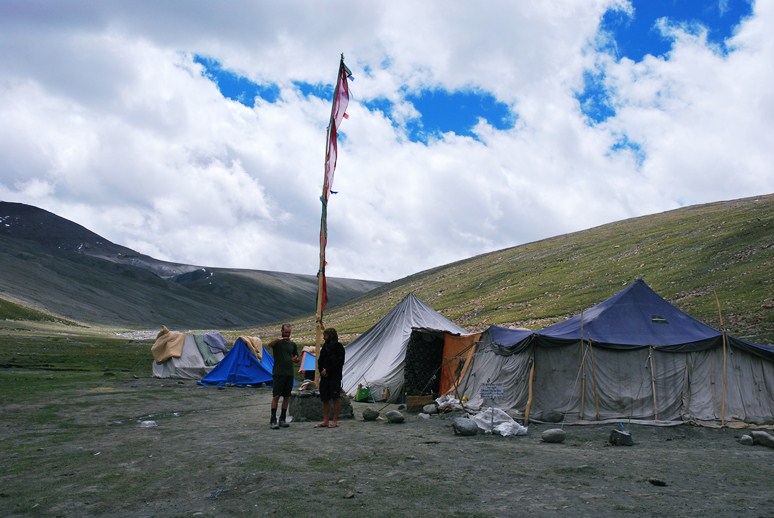
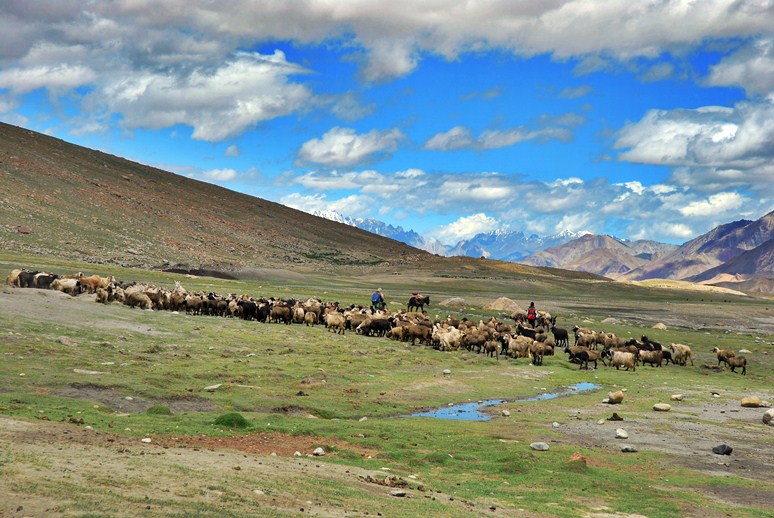
We talked with the Israeli's for an hour about trekking and
the different styles of foot travel around the world. I was rapidly
coming to appreciate the American approach to hiking over the rest of
the worlds. The Leave No Trace ethic, combined with the ideal of self
sufficiency, makes for a great mode of travel. Needing to have
hostels or guides or pack animals diminished the experience. But this
isn't the ideal in the rest of the world. The group of four was
split, with the two Israelis wanting to go over the pass in order to
make it back to Leh tomorrow, while the South African and Frenchman
wanted to stay the night to heal from blisters and acclimate a bit
more to the thin air. They lacked tents and so had to either stay
here or go all the way to the next lodging, which they would reach
sometime near 9 pm. The solution to this seemed fairly apparent and
we told the two that we'd be happy to hike with them over the pass in
the morning. The Frenchman's feet were worn raw from blisters and he
could barely walk. And so rather than take the reasonable approach,
he decided to head over the pass with the Israelis.
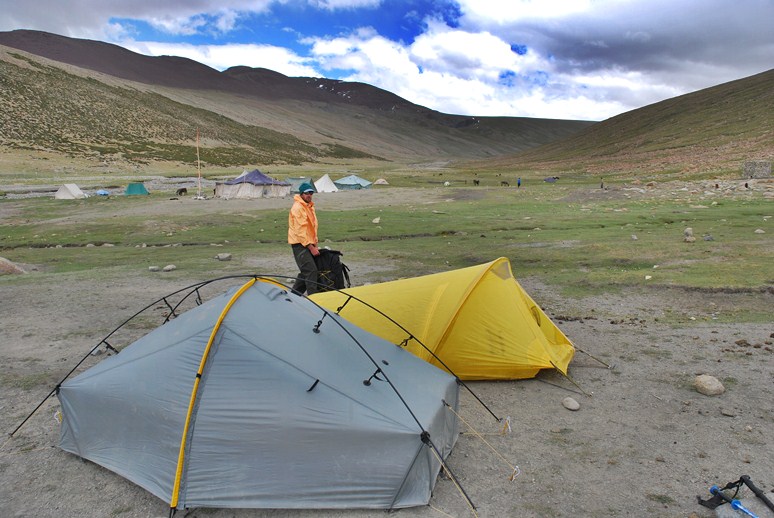
Brian and I set up camp a hundred feet from the parachute
tent in a dusty, but flat, stretch of ground where we would be out of
the way of the working animals and away from the guided groups. I
wandered around the plains and Brian headed up slope, toward the Kang
Yaze basecamp. We had time to think.
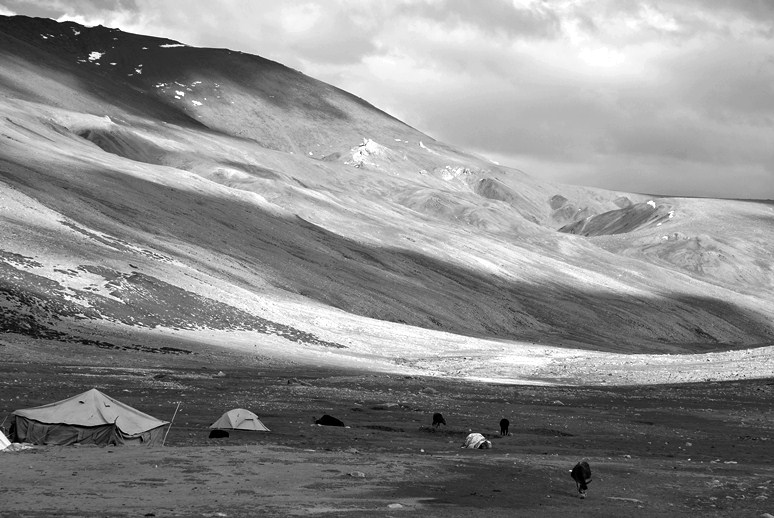
I don't need to add any words here. This is the view from my
bedroom.
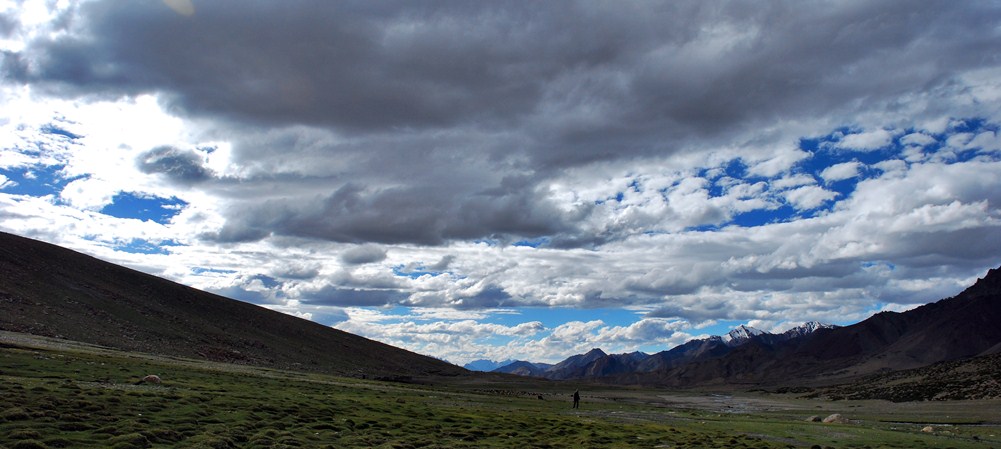
After lounging and wandering about, it was dinner time.
The stove came out for noodles and sauce and soya chunks, which
provoked the interest of the five year old bastard from the tent, who
found his way over to our campsite. We showed him the stove and kept
him from burning his hands on it (mistake number one). He really
seemed to like the soya chunks, so we offered him one (mistake number
two), which he ate part of and then spat out. And then promptly
demanded another. He proceeded to knock stuff over and began to pull
up tent pegs when we declined to let him stick his fingers in our
cooking dinner. Our attempts to shoo him away like a pest (mistake
number three) failed miserably. To quote our dear former president,
Fool me once, shame on you. Fool me twice, can't fool me again. As
the boy became more and more trying, I picked him up by the waist and
carried him, wailing and kicking, across the creeklet that bounded
our campsite and deposited him about 30 feet from camp. Of course, he
just followed me back to camp. I was determined not to be out done by
a five year old and so picked him back up, but this time put him
under my arm and against my hip, toting him like a case of beer, and
carried him all the way to the parachute tent. The bastard wailed and
wailed and wailed, but judging by the faces of the locals the kid was
a well known menace. I left him at the parachute tent and returned to
our camp site, proving myself more resilient than a five year old.
Brian and Aaron were convulsing with laughter when I got back.
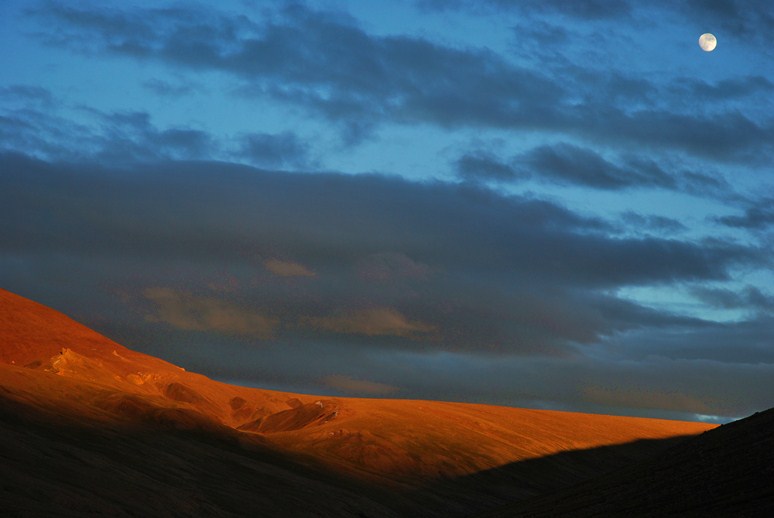
Dogs had barked and donkeys had brayed all night long, forcing me to wear earplugs in order to sleep. What sleep I did get was poor, due mostly to a lack of effort yesterday, the hardpacked ground, and the thin air here at 15,500 feet. I stuck my head out of the tent just past five am and caught the morning alpinglow on Kang Yaze. I hoped someone was climbing it this morning.
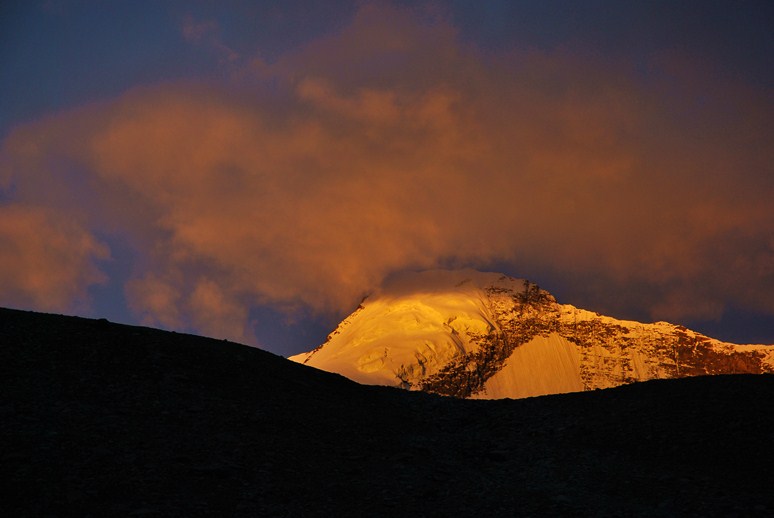
Brian and I were moving by six, past the herders'
encampment and up toward the Gongmaru La, a treeless dip in the
mountains far overhead. Although the trail was initially steep, it
soon flattened out and we settled into a comfortable pace toward the
pass. Slow, steady walking, with controlled, managed breathing. At
altitude, there is no pushing, nor is there rushing. At least there
isn't if you have half a wit in your head. In 80 minutes we were on
top of the pass, 17,250 feet above sea level.
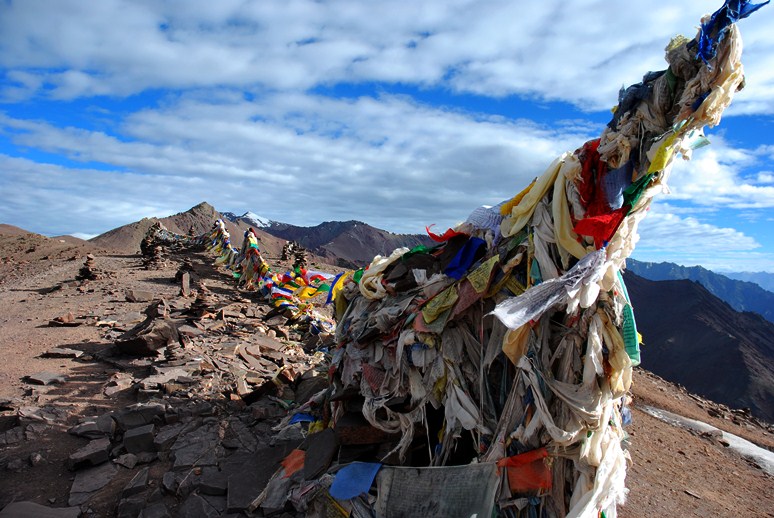
Two Frenchmen had left at 3:30 am to be one top for
sunrise. I especially appreciated the effort considering how cold it
must have been up here before the sun had come out. The new view, the
view on the other side, was one of trauma. The earth had been
seemingly ripped open, a large, long gash in the surface, carved out
by a river. It was our path forward. In the distance we could see the
mountains that backed Leh and led to Nubra. The near ground was a
steep descent into the mouth of the gorge. Treeless, as usual.
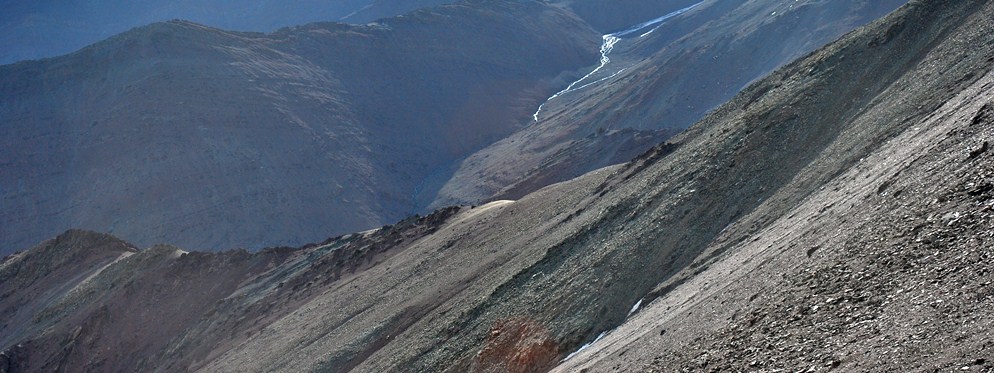
Behind us were the Plains of Nimaling with their own
backers, the Kang Yaze massif. I wondered what was further up the
valley. What would be possible with more food, more time, and more
drive. One ought to be able to wander for a long way through this
land.
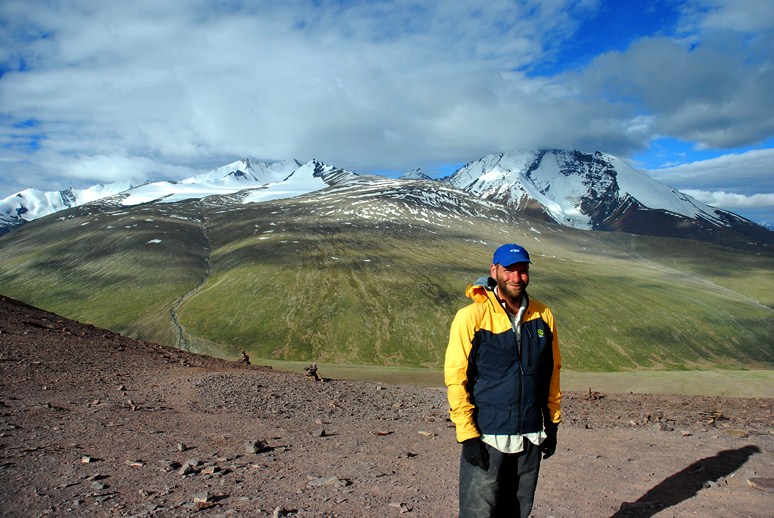
The Frenchmen left twenty minutes before we decided to
head down as well. It was cold at this elevation, in the wind,
without physical activity to warm us. It wasn't clear where we would
camp tonight, or if we might make it back to Leh. Although towns
always have some reward, Leh was such a pit that I was not terribly
thrilled to be going back to it.
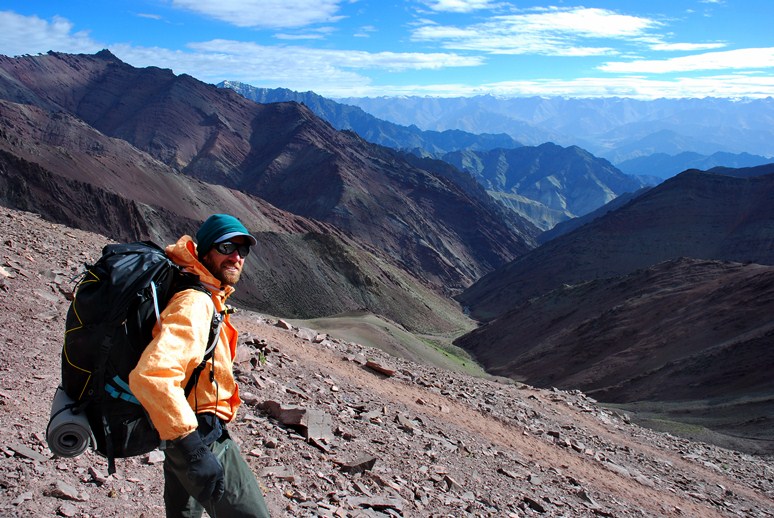
The trail dropped steeply down a sequence of switchbacks to a
sort of flat, table land area, the last camp site before the pass for
people heading in the opposite direction. As we dropped into the
gorge proper, the landform became more and more surreal. Both of us,
and Brian especially, have spent time in the desert in places where
the forces of wind, water, and time create landscapes that defy the
imagination of even the most ardent backcountry poet.
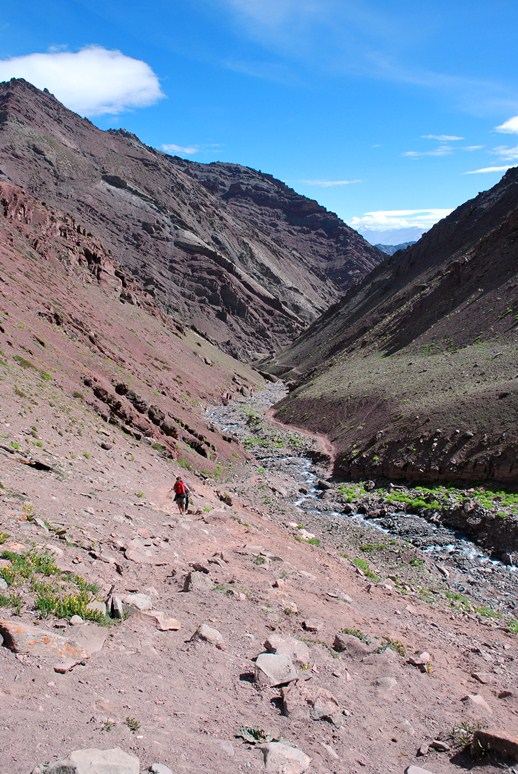
We started with the usual descriptors. Pretty.
Spectacular. Beautiful. Stunning. Amazing. As we moved deeper into
the gorge, and the route became tighter and tighter, we progressed to
the next wave, exercising a bit more imagination. Castle. Buttress.
Sculpture. And yet more. Dragon. Hogback. Demigod. Throneroom.
Serpentine. The gorge was, not to put too fine a point on it, one of
the finest hikes I've done anywhere in the world, the Grand Canyon
and Abbey Country included. Not only was the trail fun and
challenging, but the scenery was varied, exotic, and never the same.
I gave up trying to photograph it. The angles defeated me completely,
let alone the colors.
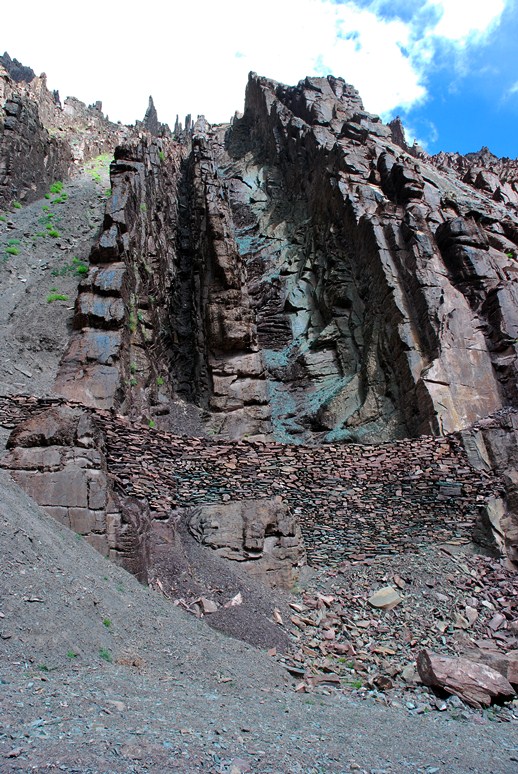
We reached the bottom of the gorge near the village of
Churkimo, where a parachute tent sat run by an old man with a beard
and a young boy, maybe his grandson, in a Che Guevara t-shirt. We
celebrated with noodles and tea. We had been playing tag with the
Frenchmen ever since leaving the pass and they arrived in time to
celebrate with their own order of noodles, though they chose Coke
over tea. We lounged for a while, but the increasing heat of the day
soon drove us out of the stuffy tent and back onto the trail, which
was more open and mellow than the tortuous, though fun, path we had
just descended.
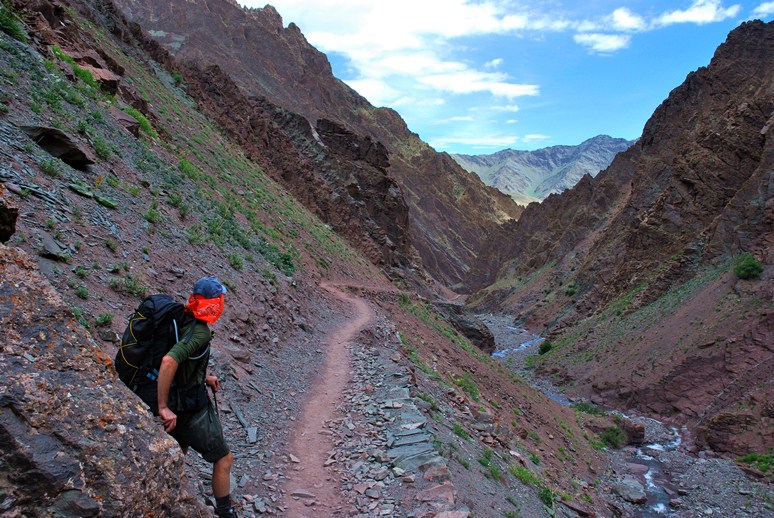
Around 1 pm we reached the very bottom, where the gravel
road was, at the village of Shang Sumdo. At the required parachute
tent I drank the required beer, a sort of cold bottle of Godfather,
whose only redeeming quality was that it was strong beer indeed. Even
Steel Reserve tastes
better, though it might not be as powerful. The Frenchmen arrived and
we pondered what to do. They had arranged for a taxi to meet them
here to cart them back to Leh, but I suspected that their taxi would
not come. The only radio phone in the village wasn't working and
there was no traffic on the road. We had passed several groups who
were heading toward the pass, so presumably there would eventually be
trucks and vans wanting a return fare.
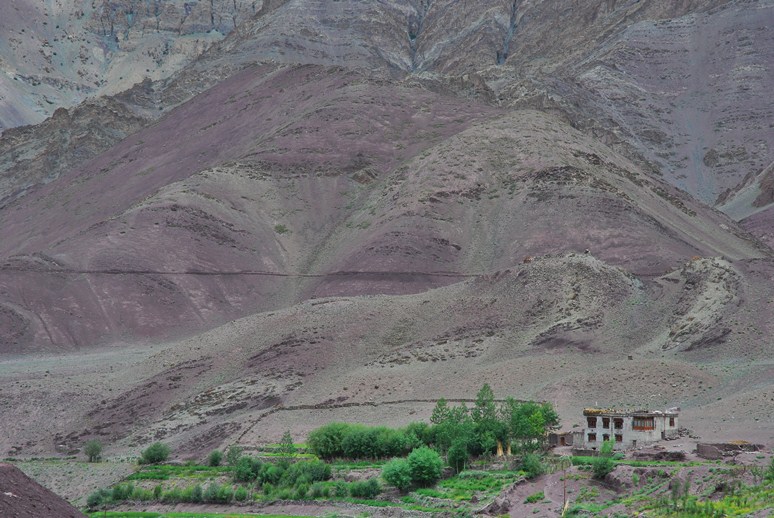
The temperature in the tent rapidly hit 100 F. Brian set off to look through the village for a way out as I lazed in the heat. This was how he met Steve, a long hair from Ashland, Oregon who was out to see the world for a while before returning to Oregon for...well, I wasn't quite sure what he did for a living there. Steve had met a driver earlier who was dropping off gear for some trekkers and would take us back to Leh in his Land Rover. Aaron arrived, as did two Euros that we had been hopscotching with earlier in the trip. Six of us, all except for the Frenchmen, who would wait several more hours for their taxi, jumped in the Tata version of a Land Rover and sped off for Leh.
I hadn't been looking forward to getting back, but having a soft place to sit and plenty of food would be a welcome change of pace for us. The Indus Valley was depressing. Nearly treeless and colored in the ever present brown, it was a place of severe depression. Living there would quickly make a religious believer out of anyone: You would need to believe in a better afterlife in order to live from day to day in such a place. Dusty, dirty, and completely lacking in anything resembling...what is a weaker word than charm? Something that conveys the sense of complete desperation and utter ugliness. What word to us? Leh was as dumpy as it was when we left. It was very hot when we arrived back at the Old Ladakh Guesthouse. Water was shut off in town. I had no beer to drink. And I had only one sandal. This was going to be hard.